- Home
- 9 Months Plan
- Episode 01
Episode 01
I’m pregnant! What now?

Sign up!
Sign up!
Hi! Subscribe to our 9-month plan by filling in your due date
and
automatically receive the information in your mailbox when you
need it. Accessible to everyone, even if you are not registered with our practice.
I am pregnant, what now?
You (and your partner, if applicable) are expecting a baby – congratulations! Whether you have just taken a pregnancy test or have been thinking about this news for a while, you will probably have a lot of questions. Don’t worry, in the 9-month plan you will find everything you can expect in the coming months. We give tips on how to stay fit and healthy, so that you can enjoy this special time to the fullest.
Obstetric care in the Netherlands
In the Netherlands, pregnancy is seen as a healthy, natural condition. That is why you are under the care of a midwife during a normal, healthy pregnancy. If necessary, for example if complications arise, the care is taken over by a gynaecologist in the hospital.
Midwives work independently, outside the hospital, so that healthy pregnant women do not unnecessarily end up in the medical circuit. You can usually just go to a midwife in your area. Are there multiple practices in your area? Then you have the freedom to choose yourself.
Think carefully about which practice suits you. Do you need a personal approach, or a more business-like approach? Do you feel more comfortable with a small, intimate practice, or would you prefer a larger one? The most important thing is that you feel comfortable with your midwife – after all, it is an exciting and special time in your life.
The midwife supports you:
During your pregnancy
As soon as you discover that you are pregnant, the first step is to call a midwife. There is usually one nearby, and contact is often very accessible. During your pregnancy, you will visit an average of 10 times for check-ups. As you get further along in your pregnancy, the appointments become more frequent.
The first appointment with your midwife, the intake, often takes the longest. During this appointment, you will discuss your health, any previous pregnancies and your expectations in detail. In the following blogs, you can read more about what you can expect during this intake.
During the follow-up appointments, the midwife will keep a close eye on how you and the baby are doing. She will measure your blood pressure, perform blood tests, check the baby’s growth and listen to the heartbeat. Ultrasounds are also performed regularly. At Onder de Linde, this is done at the practice itself.
In addition to the medical checks, there is also a lot of attention for questions and mental support. For example, at Onder de Linde, in addition to the individual consultations, we also offer a Centering Pregnancy program in which pregnant women can share stories and ask questions to pregnant women who are in the same phase of pregnancy. In addition to the regular appointments and sessions, our midwives are also available 24/7 for emergencies.
During childbirth
During your pregnancy, you can discuss with your midwife where you would prefer to give birth: at home, in the hospital or in a birthing center. This gives you the freedom to choose a place where you feel most comfortable. You can also discuss with your midwife how you want to give birth. By discussing your wishes and preferences in advance, your midwife knows exactly what is important to you during labor.
With a healthy pregnancy, you will be guided during labor by your own midwifery team. They will keep a close eye on the process and support you both medically and emotionally. If a complication occurs during labor, medical assistance may be required, such as a gynaecologist. In that case, care will be taken over by the hospital staff.
In your maternity period
The moment you have been looking forward to: the birth of your baby! For many (new) parents, this is an exciting and special time. Fortunately, the care of the midwife does not stop after the birth. In the first 10 days, the midwife remains available day and night, if you have any questions or if something unexpected happens.
In addition, you will also receive help from a maternity nurse, who usually comes to your home for a few hours every day. She will support you in caring for the baby and monitor the health of both you and your baby. She will also help you, if you are breastfeeding, with tips and support in starting up if this is a bit difficult.
The midwife will usually visit your home 2 to 3 times during the maternity week to check how you and your baby are doing. She will monitor your recovery and keep in touch with the maternity nurse, so that you can be sure that everything is going well and that you do not have to worry about anything.
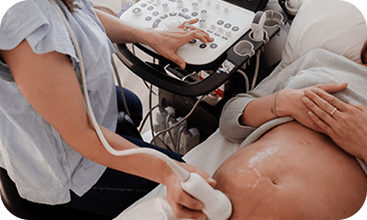
For the follow-up check
Six weeks after the birth, you will return to the practice for the follow-up check. Where possible, we will schedule this appointment with the midwife who was also present at the birth. It is a great opportunity to see each other again, ask questions about the birth and discuss how parenthood is going so far.
If you have participated in Centering Pregnancy, we will officially conclude the care with a final joint meeting: the follow-up day. This usually takes place around six weeks after the birth and offers a great opportunity to share your experiences with the other mothers.
The importance of healthy food
For the proper development of your child, it is important that you eat healthy and varied food, especially in the first weeks of your pregnancy. This is the period in which your baby’s organs and central nervous system develop. It is of course also important that you stay fit and healthy yourself. We have a number of tips for you:
Tip 1: Eat healthy and varied
Make sure you eat enough vegetables, fruit, whole grain products, proteins and healthy fats every day. A balanced diet provides the vitamins and minerals that you and your child need. Therefore, vary with different types of vegetables, legumes, lean proteins (such as chicken or tofu) and healthy fats from, for example, avocados and nuts.
Tip 2: Take folic acid
Folic acid (vitamin B11) is essential during early pregnancy as it helps develop your baby’s neural tube, from which the brain and spinal cord develop. It is recommended that you start taking 400 micrograms of folic acid per day before pregnancy and continue to do so until the tenth week of pregnancy.
Tip 3: Eat fish regularly
Oily fish, such as salmon, mackerel and herring, contain Omega-3 fatty acids that are important for the development of your child’s brain and eyes. It is recommended to eat fish twice a week, of which one should be oily fish. Note: avoid eating predatory fish, such as tuna and swordfish. These contain higher concentrations of heavy metals, such as mercury. . Do you not eat fish? Then you can take Omega-3 supplements that are suitable for pregnant women.
Tip 4: Take vitamin D
Vitamin D is necessary for the absorption of calcium, which is important for building strong bones for you and your baby. It is recommended to take 10 micrograms of vitamin D daily throughout your pregnancy, in addition to the vitamin D that you get from food and sunlight.
What to avoid
During pregnancy, there are a number of foods that you should avoid to prevent risks for you and your baby. This will be discussed in detail during the intake interview, but here are a few important points to consider:

What not to eat:
- Raw meat and raw meat products Do not eat raw steak, carpaccio, tartare or other raw meat products such as filet americain. Meat, chicken and shellfish are safe if they are cooked thoroughly.
- Raw, pre-packaged fish Avoid raw fish that is vacuum-packed. Real fresh fish, such as sushi made from freshly prepared fish, can be eaten, as long as it is really fresh.
- Raw dairy products Avoid products made from raw (unpasteurized) milk, such as some soft cheeses (such as brie or camembert). Always choose cheese and dairy products that are pasteurized.
- Unwashed vegetables and lettuce Make sure to wash raw vegetables and lettuce thoroughly to remove any harmful bacteria and parasites.
- Liver and organ meat These products contain a lot of vitamin A, which can be harmful during pregnancy. Therefore, avoid liver and organ meat.
- Alcohol Even in small amounts, alcohol can be harmful to the development of your baby. It is recommended not to drink alcohol at all during pregnancy.

What you should not eat too often:
- Caffeine Limit drinks containing caffeine, such as coffee, black tea and energy drinks, to a maximum of three cups per day. Too much caffeine can lead to a lower birth weight.
- Licorice tea and star mix Limit these drinks to 1 to 2 cups per day. Too much licorice can cause high blood pressure.
- Soy products do not eat more than four glasses or bowls of 150 ml per day. Soy products contain substances with a weak estrogenic effect. If you consume high doses of these during pregnancy, this could possibly affect the development of the baby’s sexual organs.

The balance in a healthy lifestyle
Staying fit and living healthily not only involves a healthy diet, but also sports and exercise, hygiene and good mental health.
Exercising is important to stay fit. Therefore, try to keep moving during your pregnancy. Keep exercising calmly during your pregnancy. This is important for your condition and you have less chance of pelvic complaints, high blood pressure and gestational diabetes.
Please note sports such as diving and contact sports such as kickboxing and hockey are no longer allowed during your pregnancy.
Did you know that you also have less resistance to infections during your pregnancy? Pay close attention to your hygiene and wash your hands regularly. It is good to handle everything that has come into contact with raw meat, such as cutting boards and the like, with care.


Please note: wear gloves when gardening or cleaning the cat litter box.
Stress can also have a negative effect on your pregnancy. The effects of stress are comparable to smoking. Make sure you try to minimize stress as much as possible.
Tip: Yoga during pregnancy can help reduce your stress level. It helps you relax and connect with your baby.
On to the next step: the midwife
Are you between 6 and 8 weeks pregnant? Then your next step is to come for an intake with the midwife. Do you want to know more about this intake and see what you can expect? Watch our next episode.
To do
- Take 400mg folic acid daily
- Keep enjoying each other, then getting pregnant will be easier.
Episode 02
The first appointment with the midwife: the intake

Sign up!
Sign up!
Hello! Sign up for our 9-month plan by filling in your due date
and
receive the information automatically in your mailbox when you
need it. Accessible to everyone, even if you are not registered with our practice.
The first appointment with the midwife: the intake
The first appointment at Onder de Linde, the intake, is coming up. During this appointment you will receive a lot of information and good preparation helps to get the most out of this conversation. In this second part of the 9-month plan you can read what you can expect from the intake.
Did you know that you can also have an early ultrasound with us? This ultrasound often takes place around the 7th to 8th week of pregnancy and can sometimes be scheduled before the intake interview.
In this part of the 9-month plan you can read about:
- The questions you can expect during the intake, such as about your medical history
- The checks and examinations that we perform
- The early ultrasound
- Information about prenatal tests
Your first appointment: the intake
You are now between 6 and 10 weeks pregnant and so the intake is on the program. For many expectant parents, this is the first meeting with the midwife and an important part of the 9-month plan. After your registration, you will receive a link to an intake questionnaire at Onder de Linde. Fill this in at home and send it back to us before the intake interview.
The intake interview
The intake interview can be extra exciting during your first pregnancy, which is why we take plenty of time for it. The appointment lasts about 45 to 60 minutes and prepares you for what you can expect in the coming months.
During the intake interview, we discuss a wide range of topics. For example, we talk about your wishes and those of your partner, we provide information about medical examinations and ultrasounds, and we answer all your questions. Some important topics that we discuss during the intake interview are:
Medical history
The midwife wants to get to know you and your partner well. A large part of the intake is therefore the medical history, also called anamnesis. Questions are asked about your general health and possible congenital abnormalities. Together with the midwife, you discuss whether there are diseases in your (or your partner’s) family that could affect your pregnancy.
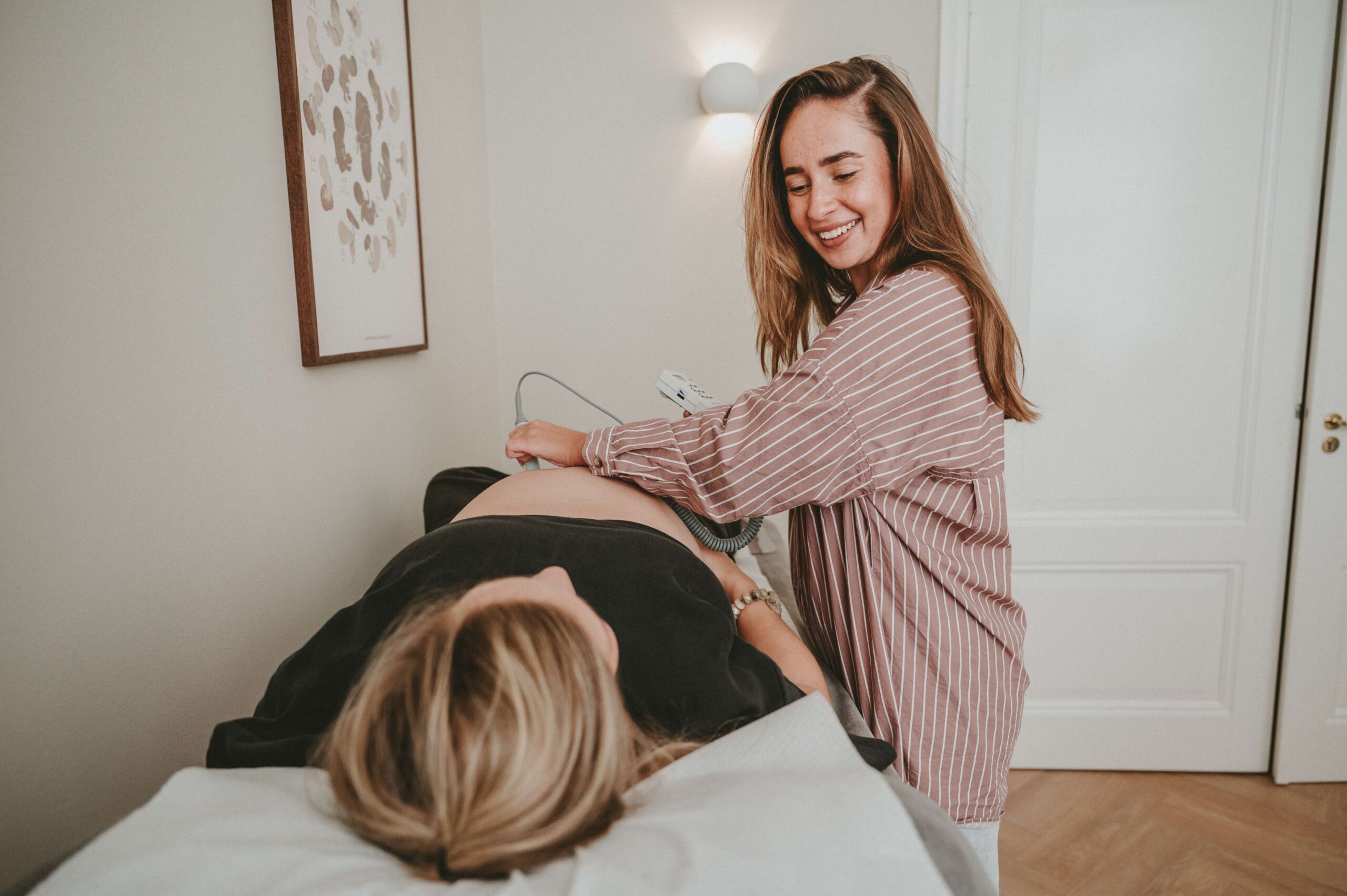
Checks and tests
During the intake, we also perform a number of medical tests. For example, we measure your blood pressure, calculate your BMI and sometimes take blood at the same time. The following data are checked in the blood of all pregnant women in the Netherlands: blood group, rhesus D and C factor, lues (syphilis), HIV and hepatitis B. We also check the iron content in your blood.
Additional tests may be recommended based on personal circumstances, such as work, diet or medical history of you or your partner.
Early ultrasound
The early ultrasound is performed if you wish or if the midwife sees a medical reason, for example previous miscarriages or blood loss. During this ultrasound, usually around 7-10 weeks, we check whether the fetus is in the uterus, whether the heart is beating and whether there is a multiple pregnancy.
The care plan
Based on all the information discussed, you and the midwife will draw up a personal care plan. Which tests do we recommend, based on your medical history and wishes? We will also discuss signals or reasons to contact the midwife. This will create a care plan that perfectly matches your wishes and situation.

Prenatal testing
The midwives at Onder de Linde are happy to support you in making a choice for prenatal testing. Would you like to know more about this? We would be happy to discuss it with you. We focus on your wishes and choices. We discuss the possible effects and consequences of a certain result.
Because, what do you do if the result is abnormal? Do you think it is important to get all the information that is available and do you want to know it? Answering these questions can help you make a well-considered choice.
During the intake, we will provide you with information about prenatal testing. In some cases, we can already detect possible congenital abnormalities during pregnancy. For example, we will tell you about:

The NIPT
The Non-Invasive Prenatal Test (NIPT) can be used to check for certain chromosomal abnormalities, such as trisomy 13, 18 and 21, which lead to Patau, Edwards or Down syndrome. This test is performed by taking blood from the mother, without the risk of miscarriage. Since 2017, (expectant) parents in the Netherlands have had the option of having this test performed, but it is not reimbursed by insurance.
The blood test takes place in an academic center as part of the Trident-2 study. The NIPT has a high reliability of approximately 99% for these three syndromes, but no test offers complete certainty. In the case of Down or Edwards syndrome, the result can be false positive in 2-4% of cases; for Patau syndrome this percentage is higher, up to 47%. In the event of an abnormal result, further research is recommended to confirm the diagnosis.
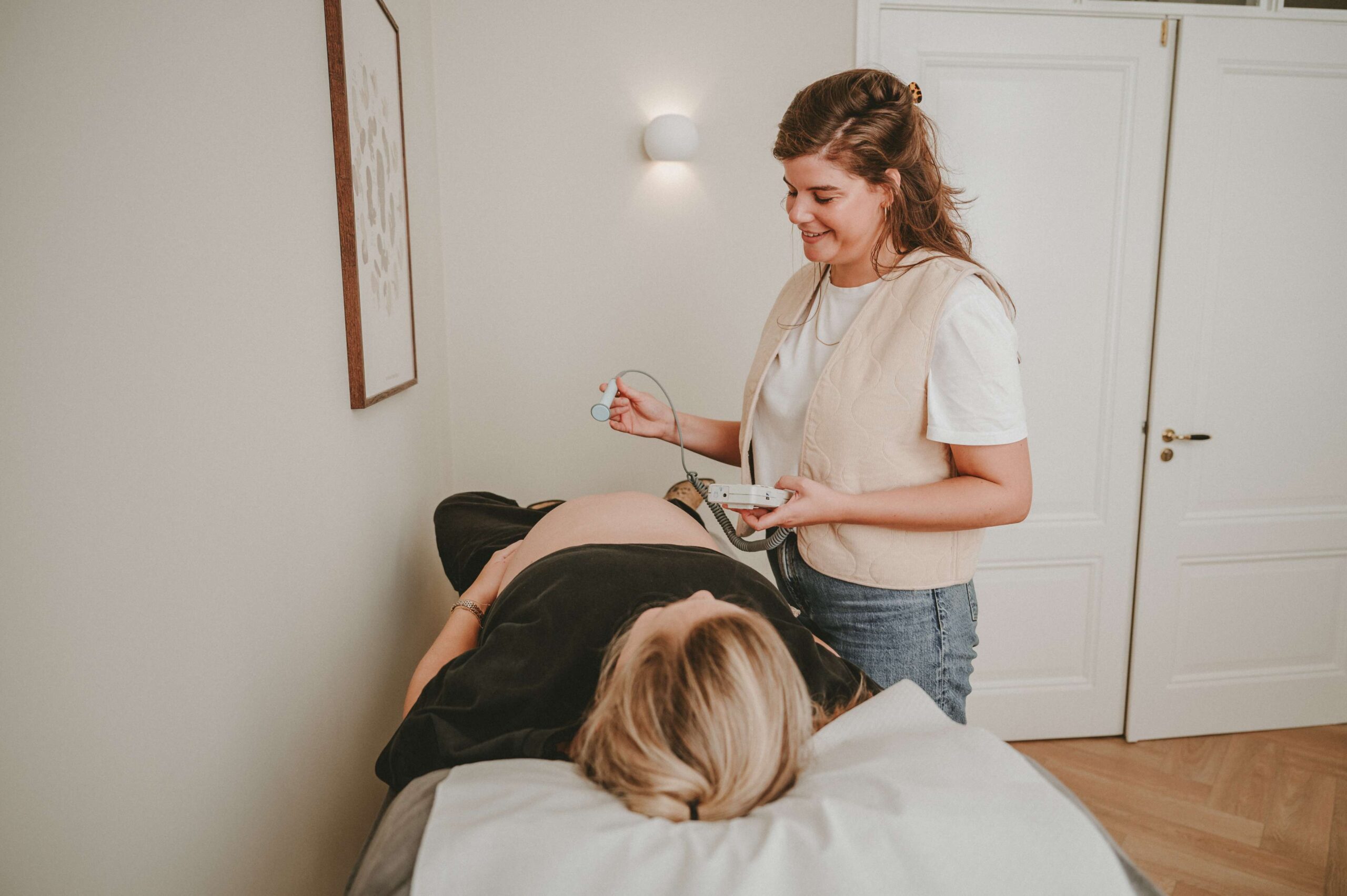
The 13-week ultrasound
The 13-week ultrasound is an early screening for physical abnormalities that can be performed between 12+3 and 14+3 weeks of pregnancy. During this ultrasound, we look at the physical development of your child, the amount of amniotic fluid and we check the growth. This ultrasound gives an early indication of possible abnormalities, which offers room to use additional examinations or guidance in a timely manner.
The 20-week ultrasound
The 20-week ultrasound is an extensive examination in which your baby’s organs are examined in detail to detect possible congenital abnormalities. This examination takes place around the 20th week of pregnancy. Other medical checks are also performed, such as assessing the position of the placenta and the amount of amniotic fluid. We will take the time to discuss the results with you.

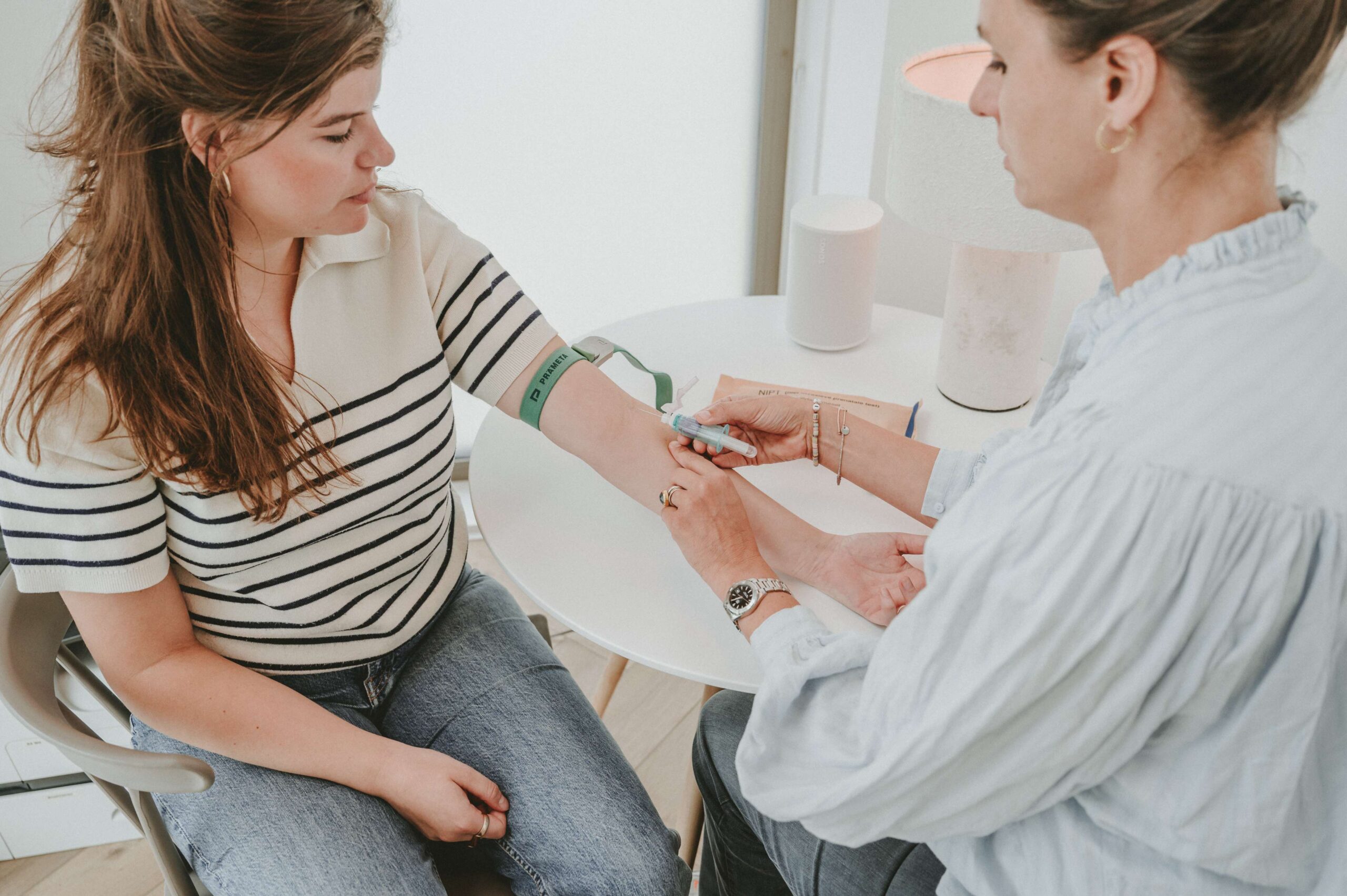
Both the NIPT and the 13- and 20-week ultrasound scans can be performed at Onder de Linde’s practice!
It is understandable that the possible outcomes of prenatal testing are accompanied by difficult choices. In some cases, difficult decisions have to be made about whether or not to continue the pregnancy. We want to support you in this process and help you weigh all the options. If desired, a decision aid is available that can support you in making a decision that suits you.
Do you or your partner have family members with certain abnormalities where it is unclear whether these are hereditary? Then we can refer you to the department of clinical genetics. Here we can investigate whether hereditary predisposition plays a role in the development of congenital abnormalities.
Feel free to contact us if you have any questions or if you would like help in making a choice that suits your situation. Together we will look at the possibilities, so that you feel well informed and supported during the pregnancy.
Good luck with your intake!
Episode 03
You are almost halfway through your pregnancy

sign up!
Write you in!
Hi! Subscribe to our 9-month plan by filling in your due date
and
automatically receive the information in your mailbox when you
need it. Accessible to everyone, even if you are not registered with our practice.
You are almost halfway through your pregnancy
Congratulations! You have already reached many milestones and are now almost halfway through your pregnancy. This often means that you have already told most people around you about your upcoming baby and that the first preparations have started. In this part of the 9-month plan, we share important information that can be useful around the 20-week mark, such as:
- The 20-week ultrasound
- Recognition of your baby
- Pregnancy complaints and courses
You’re halfway there!
The second trimester brings new energy for many expectant parents. As you prepare for the second half of your pregnancy, we want to give you some useful tips and information for this period.
The 20-week ultrasound
The most important part of this period is the 20-week ultrasound. This takes place between 18 and 20 weeks. You decide whether you want to have this examination performed. During this ultrasound, extensive examination of your baby and your uterus is performed.
Our sonographer will take you through what she sees during the examination. She will explain everything clearly and show you what it means. She will look at the growth of the baby. The development of the baby will also be examined; is the spine closed properly, are all limbs well developed and are all organs well formed? She will also check the amount of amniotic fluid and the location of the placenta. The ultrasound generally takes 40 minutes.
The ultrasound does not provide complete certainty about the health of your baby, because some abnormalities are not visible. If the sonographer sees something abnormal during the ultrasound, a follow-up examination can be scheduled (this is the case for approximately 1 in 20 women). This follow-up examination may be necessary due to abnormal growth or a placenta that is in a different place. Fortunately, most women appear to be fine after the second ultrasound.
If your pregnancy is going well, the 20-week ultrasound is usually the last medical ultrasound. However, you may be eligible for a position ultrasound around 36 weeks, if the midwife deems this necessary to check the position of your baby. In addition, you can always opt for an additional fun ultrasound in 2D, 3D or even 4D to look at your baby again.
Would you like more information about the 20-week ultrasound? View our page here or read the RIVM brochure for more information.

Gender determination ultrasound
If you are between 15 and 16 weeks pregnant, you can also schedule a separate gender determination ultrasound with us to see the gender of your child. This ultrasound is not reimbursed. The gender can also be determined during the 20-week ultrasound, but keep in mind that this ultrasound primarily has a medical purpose.
Recognition of your child
Do you want all legal matters concerning your child to be properly arranged? Then your partner can already acknowledge the child before birth. This is not necessary if you are married or have a registered partnership, but it is certainly advisable in other situations. Recognition gives your partner legal rights and ensures that an official bond is created.
How does it work? To arrange recognition, you and your partner go to the town hall together, preferably before 24 weeks of pregnancy. You can choose the surname for your child right away. Since 1 January 2024, you can give your child a double surname. This means that your child can bear both the father’s and the mother’s surname.
Since 1 January 2023, if recognition is given during pregnancy, parental authority after birth is also automatically arranged.
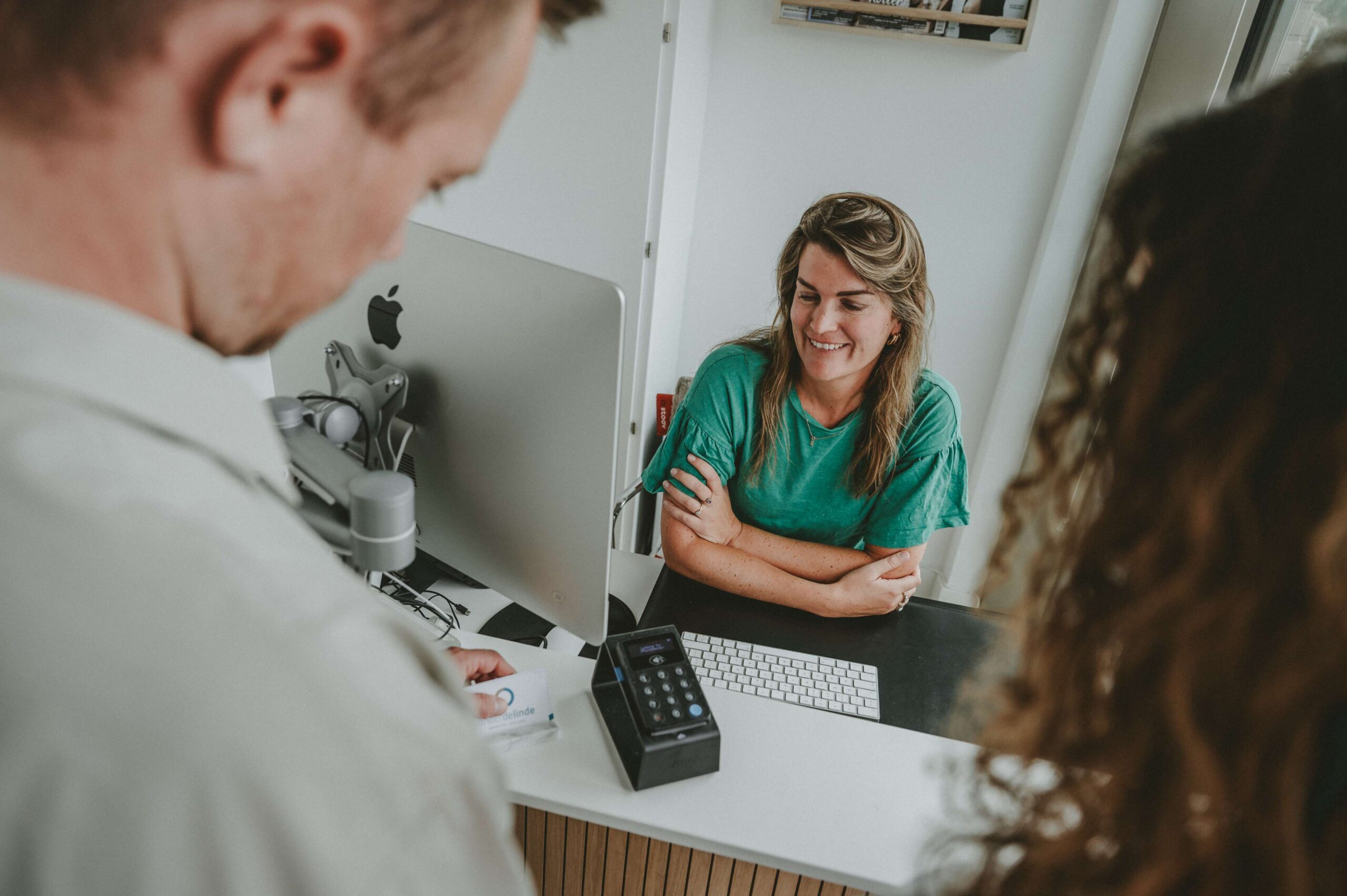
Pregnancy complaints: how do you deal with them?
In this phase, complaints such as back and pelvic pain are common. Due to the growth of your uterus and the softening of the pelvic joints, you can sometimes experience discomfort. Ligament pain, which is caused by the stretching of the ligaments that attach your uterus to your pelvis, is also common and can be experienced as a stabbing pain.
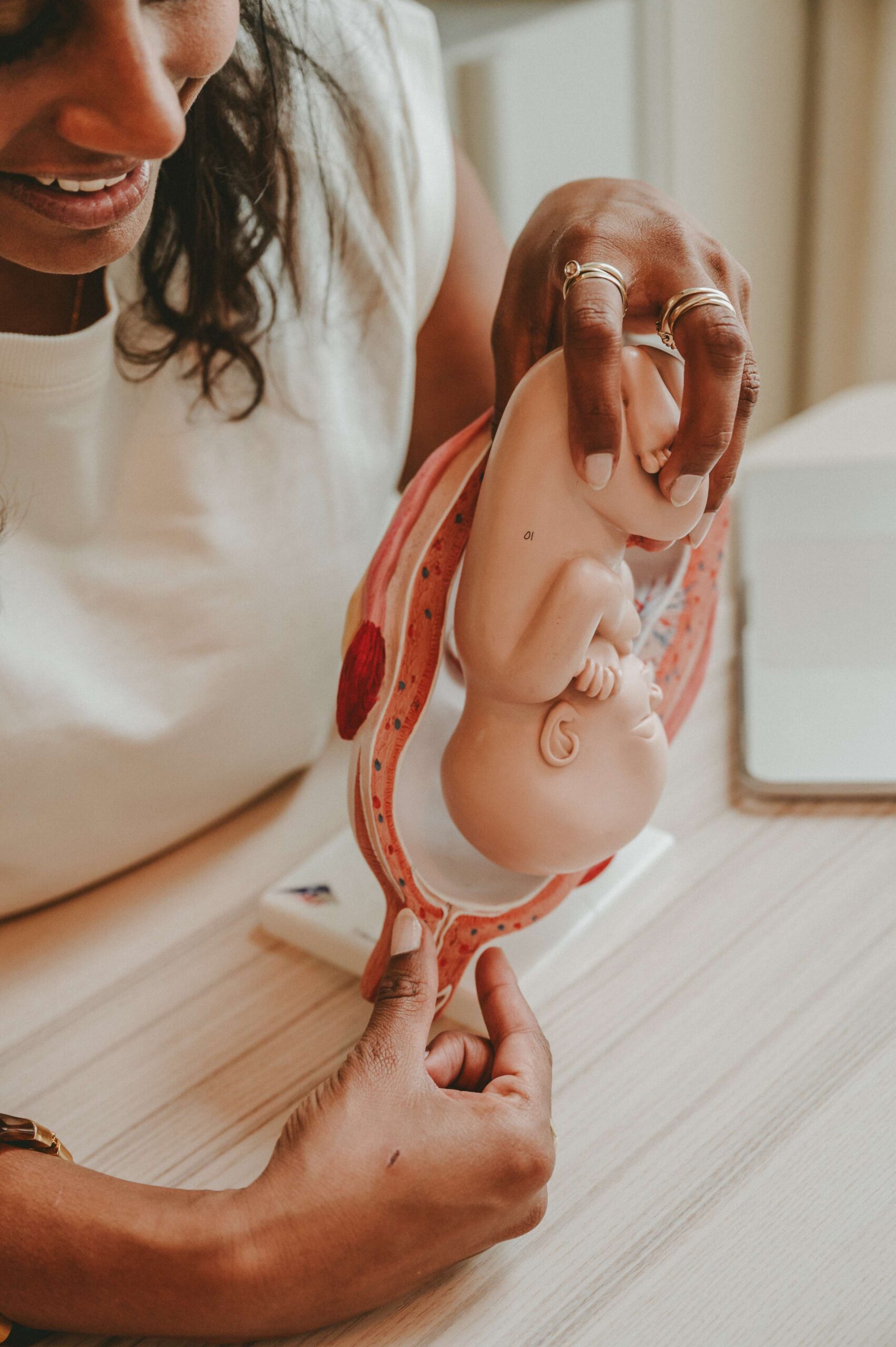
Tips for pelvic and ligament pain:
- Make symmetrical movements to keep your pelvis stable.
- Avoid heavy lifting and sudden movements.
- Get enough rest and pay attention to your posture.
- Warm showers, a bath or a hot water bottle can provide relief from pain.
At Onder de Linde we work together with a specialized pelvic physiotherapist who can help you prevent and alleviate complaints. She is present in our practice one day a week.

Pregnancy classes
The second trimester is a good time to look into a pregnancy class. This will help you prepare physically and mentally for childbirth and you will learn techniques such as breathing exercises, relaxation methods and useful positions for childbirth.
At Onder de Linde we offer various courses, from hypnobirthing and pregnancy yoga to mindfulness and more. You can choose a course together with your partner, in a group with other pregnant women, or individually. For all the possibilities, see our page: Pregnancy courses at Onder de Linde.

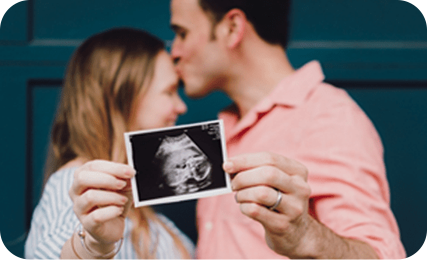
What will change in your life?
The arrival of a child will have a major impact on your life and your relationship. Think about the division of care tasks and what you consider important in parenting. Talking about this together can help you align expectations and prepare yourself well for parenthood. There are also online courses available that can help you with these important questions.
On to the second half of your pregnancy! We wish you the best of luck and are here to support you during this special time.
Read Tips
The growth guide and soonzwangerworden.nl contain tips and advice on how to
get pregnant as healthily as possible.
To do
- Take 400mg folic acid daily
- Keep enjoying each other, then getting pregnant will be easier.
Episode 04
You’re halfway there!
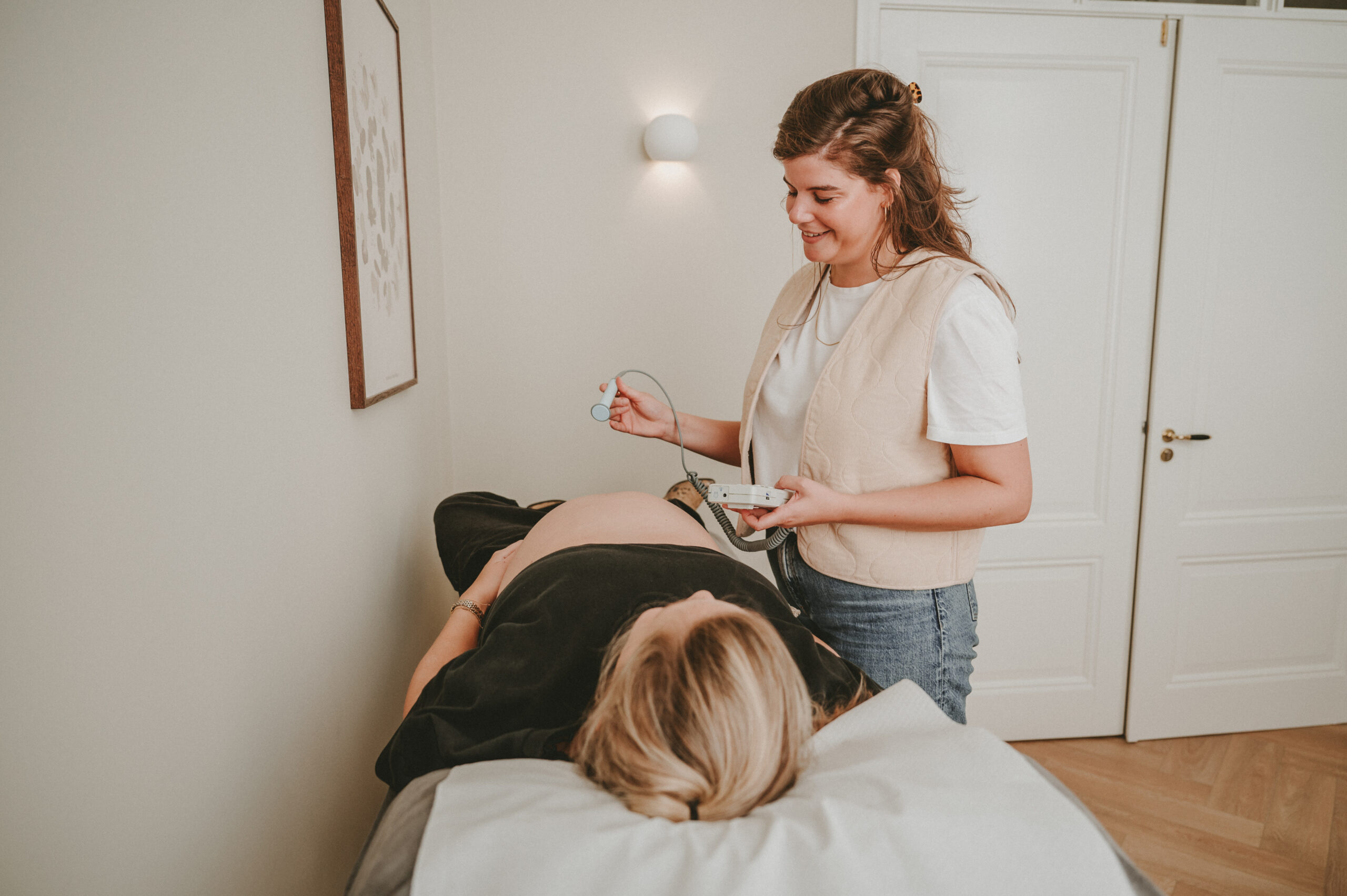
sign up!
Write you in!
Hi! Subscribe to our 9-month plan by filling in your due date
and
automatically receive the information in your mailbox when you
need it. Accessible to everyone, even if you are not registered with our practice.
You’re halfway there!
Congratulations, you’re already halfway through your pregnancy! Your belly is growing more and more, your baby is actively moving, and the delivery is slowly getting closer. You’re now in the exciting second half of this special time. In this phase, you’ll often come across a lot of new information, and new questions arise about what to expect.
In this part of the 9-month plan, we discuss:
- How your baby grows and moves
- Nutrition for your baby after birth
- Ways to rest and take care of yourself
Read on for valuable tips, information, and handy facts that will help you have a relaxed and well-informed last half of your pregnancy.
How your baby grows and moves
You may feel your baby moving regularly by now! Around 28 weeks, it is important to feel your baby’s movements every day, so that you learn what is normal for him or her. As your pregnancy progresses, your baby will have less space in the womb, which can make the movements feel a little softer. Be especially alert to these changes: a different movement is usually not a problem, but do not hesitate to call us if you have any doubts.
Tip: Relax regularly and try to sit still for a while at fixed times. This will help you to feel and recognize your baby’s movements well.

Feeding Your Baby: Breastfeeding or Bottle Feeding?
This is a good time to think about how you’re going to feed your baby. Breastfeeding and bottle feeding each have their own benefits. Here’s a look at what each option entails and how to prepare.
Breastfeeding
Breastfeeding contains all the nutrients your baby needs to grow. It is tailored to your child’s needs at any given time. Breastfeeding also contains antibodies that strengthen the immune system, promotes bonding between mother and child, and protects against lifestyle diseases and obesity. That is why breastfeeding is the best food for your child, if you have the opportunity to do so, of course.
Breastfeeding is not only very good for your child, but also quite efficient. You always have it with you at exactly the right temperature. It also has advantages for you as a mother:

- You (often) lose less blood after giving birth
- (slightly) lower risk of breast and ovarian cancer
- You often return to your normal weight more quickly
If you want to breastfeed, it is important to prepare yourself for it. This increases the chance that you will be more relaxed and that breastfeeding will be successful. It helps to read up on it, listen to podcasts or attend a briefing. This way you will know what to expect.
Lactation support
When you have given birth to your first child, breastfeeding can still take some getting used to. That is why the maternity nurse and midwife will help and support you with breastfeeding during the first week. If you or they need a little more help from an expert, they will call in the lactation consultant.
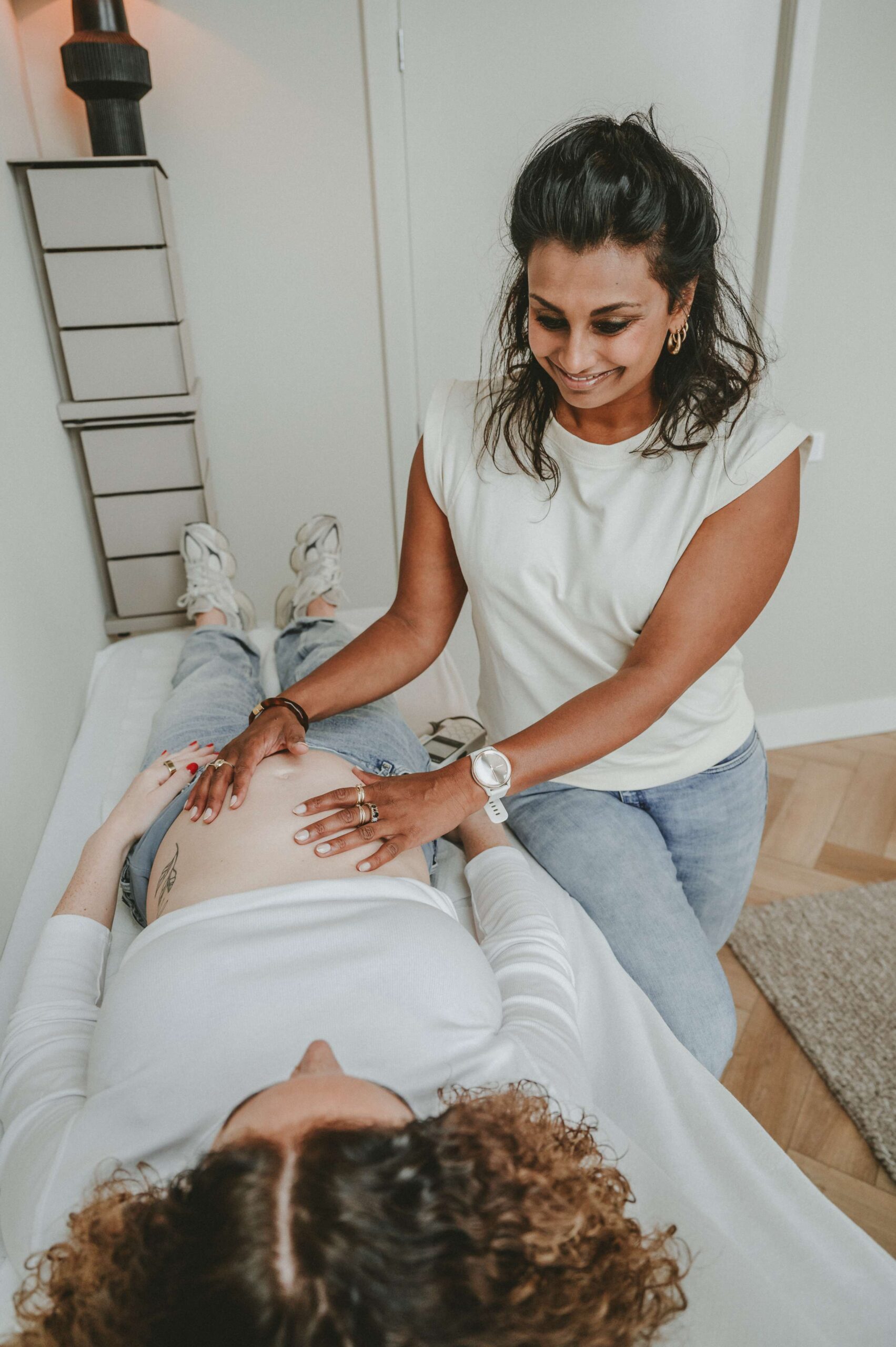
Bottle feeding
If breastfeeding is not possible or you prefer not to choose this option, bottle feeding is a good alternative. In the Netherlands, the composition requirements for bottle feeding are laid down by law, so that your baby gets all the necessary nutrients. An advantage of bottle feeding is that your partner can help feed your child.
Vitamins
Are you breastfeeding? Then it is recommended to give your baby 150 micrograms of vitamin K daily until he or she is three months old, for good blood clotting. From birth to primary school age, 10 micrograms of vitamin D per day is also required.
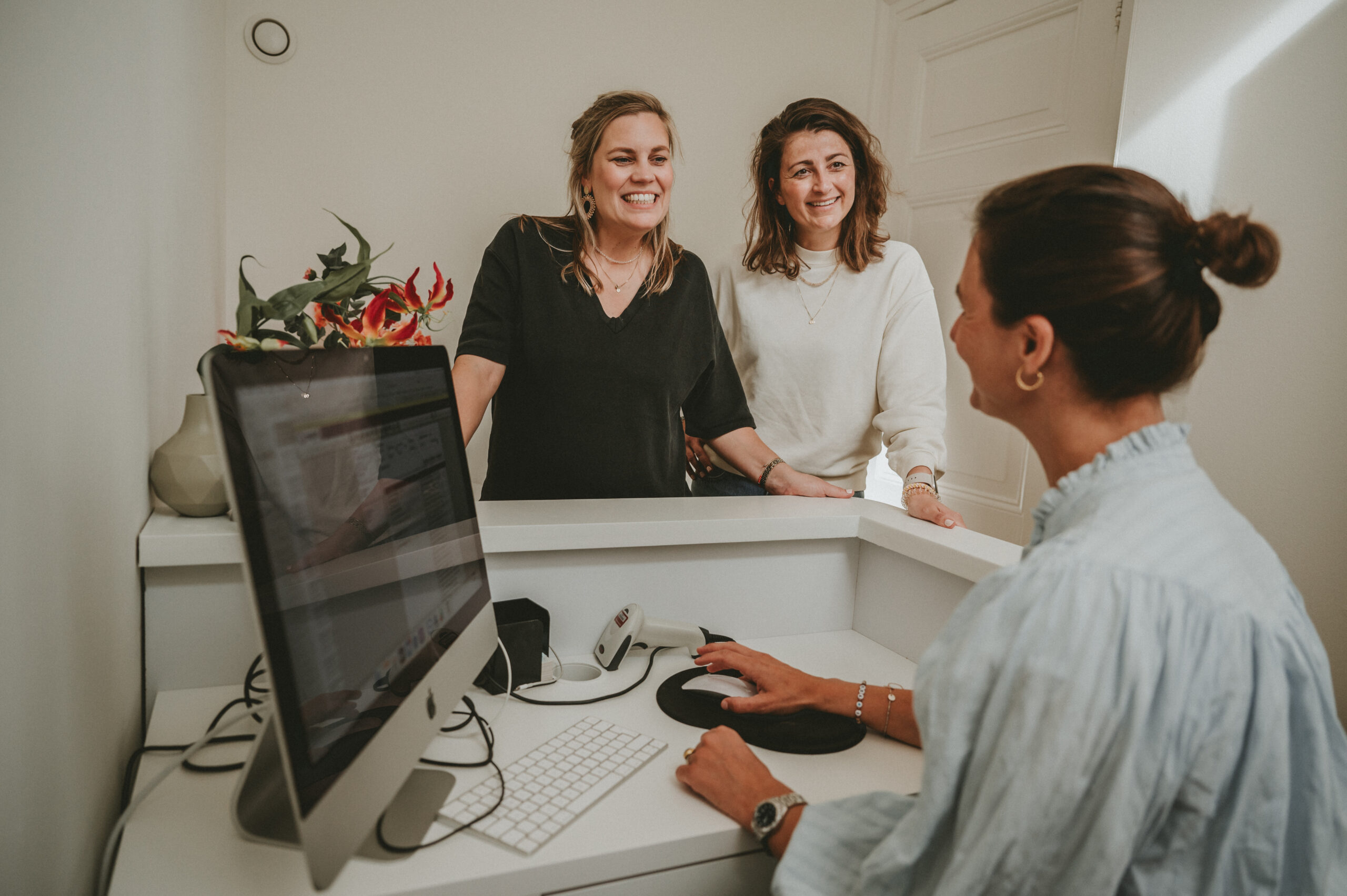
Energy, intimacy and peace
As your pregnancy progresses, you may notice that your energy increases again. Perhaps your libido was a bit lower in the past months, but that is now returning. You can have sex with your partner until the birth. Sometimes, due to the increased blood flow, some blood loss can occur after intercourse; this is usually harmless, but it is good to let us know.
Take enough time to relax every day. Your body is working hard and extra moments of rest are good for you and your baby.
Useful preparations for this phase of your pregnancy
- Arrange a maternity package: Check whether your insurance covers a maternity package. If not, you can also purchase one yourself through us
- Information meeting about breastfeeding: If you are considering breastfeeding, a meeting can prepare you well and answer many questions.
- Pregnancy course: A course prepares you physically and mentally for childbirth. There are many options, from hypnobirthing and pregnancy yoga to practical breathing techniques and relaxation exercises.
Several pregnancy courses are offered at Onder de Linde practice. Click here for more information.


On to the third trimester!
The last half of your pregnancy is a special time full of growth, preparations and anticipation. Take the time to let everything sink in and listen to your own wishes and needs. We are here to support you and answer your questions when necessary.
Enjoy this phase and the magical moments with your baby in your belly!
Episode 05
The birth is really getting closer now

sign up!
Write you in!
Hi! Subscribe to our 9-month plan by filling in your due date
and
automatically receive the information in your mailbox when you
need it. Accessible to everyone, even if you are not registered with our practice.
The birth is really getting closer
The final preparations are being made and you are starting to prepare for the birth. Perhaps you have already taken a birthing course or are busy writing a birth plan. Because you don’t want to leave anything to chance, we will give you the most important information and tips for the birth in this episode.
In this part of the 9 month plan we share the latest tips and facts about:
- The place of birth
- Writing a birth plan
- Birth positions
- Pain relief and pain relief
Everything you need to know about preparing for childbirth can be found on this page. Check it out now and put the finishing touches on it.
The birth is in sight
Your birth is getting closer. You may already be preparing yourself by taking a birthing course or watching birthing videos. It is good to prepare yourself for this special day, so that you know what to expect. That is why we have listed the most important points for preparing for your birth in this part of the 9-month plan.
Where do you want to give birth?
You are probably busy preparing for your birth. Not only by completing your to-do list, but your body is also slowly preparing itself. Your cervix is softening and shortening; these are the first steps your body takes to prepare for the birth. It is important to think about where and how exactly you want to give birth.
The place where you want to give birth is crucial. An environment where you feel relaxed and safe ensures that you can give birth in the best possible way. This is where your body produces the most oxytocin, also known as the labor hormone.
Home birth
Giving birth in your own familiar environment is an option. Scientific research shows that home births are just as safe as hospital births. Just as many healthy babies are born at home as in the hospital. Even during a home birth, midwives have all the necessary resources with them to make the process safe and pleasant. Did you know that no less than 96% of women who give birth at home look back positively on their experience?

Outpatient delivery
If you give birth in the hospital without a medical indication, we call it outpatient. You rent a hospital room, as it were, where you give birth under the supervision of a midwife. We work together with the Spaarne Gasthuis, where most outpatient deliveries take place. On rondzwanger.nl you can view a digital tour to get an impression of the delivery rooms.
Giving birth in a bath
Giving birth in a bath is also possible at home in your living room. Some hospital birthing rooms also have a birthing pool. Giving birth in water has several advantages:
- You experience less pain due to the heat and counter-pressure of the water.
- The water pressure provides more pressure on the dilation edge, which makes dilation go more smoothly.
- You can easily change positions.
- The chance of tearing is smaller.
- Babies are born calmer in a bath and are often more relaxed immediately after birth.
If you would like more information about the options for giving birth in a bath, please feel free to contact us. One of our midwives can tell you which hospitals offer these options and where you can arrange a birthing pool for home.

Delivery positions
It’s your delivery, so you decide which position you give birth in. Try different positions so you can experience what feels best for you. Changing positions stimulates contractions, dilation and birth, and gives you a sense of control. Did you know that women experience less pain if they change positions regularly during labor? In addition, labor often lasts shorter. Examples of delivery positions are:
- Standing while catching a contraction, while rocking your hips.
- Sitting on a stool or on a skippy ball.
- Lying on your side
- Leaning forward on the table or countertop.
- Sitting on your hands and knees during back pain.
- Walking around.
- Sitting on the birthing stool while pushing.

Birth plan with your wishes
A birth plan can be very useful for a relaxed birth. In the birth plan, you describe your wishes regarding the birth and communication. Write down ten points that are really important to you.
It is good to put your wishes on paper, but keep in mind that a birth can always go differently. Don’t be disappointed if things don’t go as you had described. It is important to think about it. Make sure your birth plan is in your hospital bag, so that you have it at hand if you do not give birth with your own midwife.
Around 35 weeks of pregnancy, we will discuss your birth plan and wishes, and we will tell you when to call the midwife if labor starts.
Everything about pain during labor
You have probably already spoken to other mothers or read information about childbirth. A common fear among (future) mothers is pain during labor. However, women are able to tolerate the pain well.

During labor, the intensity of the contractions and thus the pain gradually increases. This way, you gradually get used to the feeling and you let yourself be stretched further and further. During labor, your body produces endorphins, a hormone with a pain-relieving effect. The mental aspect of labor is also crucial. Try to stay with yourself and realize that you were made for this.
Here are some tips to ease your contractions:
- Exercise: Exercise promotes the labor process and helps to distract your thoughts.
- Heat: Heat relieves pain, such as in a bath, but warm socks can also contribute to a pleasant temperature.
- Massage: Massaging the lower back can ease the pain.
- Increasing comfort: A good posture, nice pillows and comfortable clothing can help to make the pain more bearable.
- Breathing: Puffing away contractions and deep abdominal breathing ensure calm breathing and a good oxygen supply in your body.
In the Netherlands, you can choose whether you want to use pain relief or painkillers. Doctors and midwives believe it is important that this choice is well-considered. It is best to make this decision during labor, because then you will know better whether you really need it.
Pain relief
If you can no longer tolerate the pain yourself, pain relief can provide a solution. This is especially effective for back pain. For example, you can use a birth TENS, a device that delivers electrical pulses to your back and thus reduces the pain. This is possible both in the hospital and at home. Another option is sterile water injections, which you can also use during a home birth. The injections are sensitive, but they relieve the pain in your lower back, which significantly reduces the pain of the contractions for 2-3 hours. Both the TENS and the sterile water injections are safe for you and your baby.
Pain relief
With other methods of pain relief, we will transfer you to the hospital during the birth. This is necessary because these methods can affect the condition of you or your baby, which requires extra monitoring. You will then give birth under the supervision of the clinical midwife.
- Remifentanyl: This is a morphine-like substance that you can administer to yourself via an IV with a pump. This reduces the sharpness of the pain. You can administer something to yourself every 3 minutes. In rare cases, this can lead to a short-term cessation of breathing, which is why monitoring your blood pressure and oxygen levels is important.
- Epidural: This is the most effective pain relief, often (but not always) relieving most of the pain. However, it can happen that your contractions weaken due to the epidural, which is why contraction inducers, vacuum extraction or a caesarean section are used more often. Another disadvantage is that 10% of women who receive an epidural develop a fever, which can lead to antibiotics being administered via an IV, which means that your baby will also have to receive an IV with antibiotics for the first 48 hours.
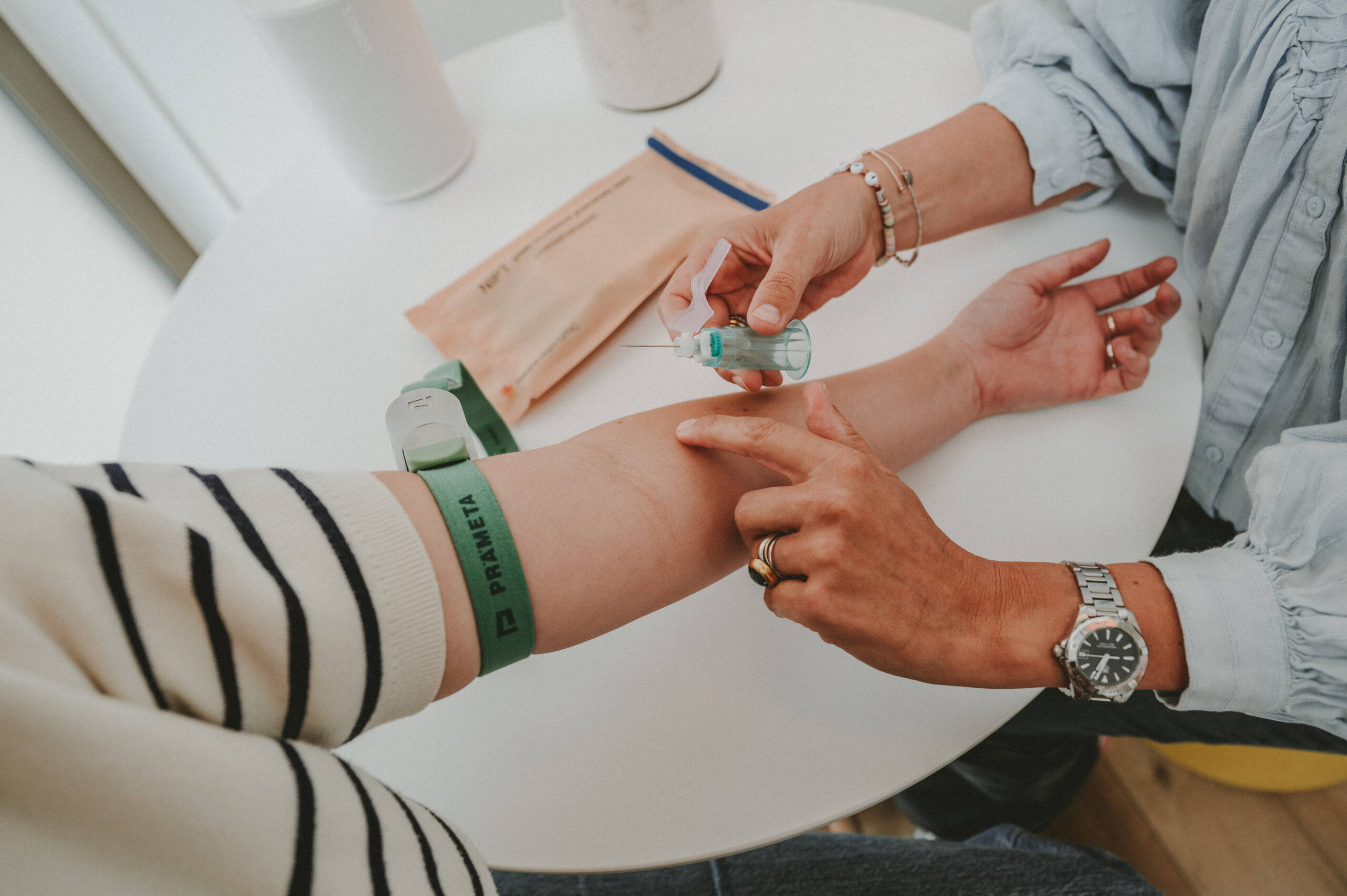
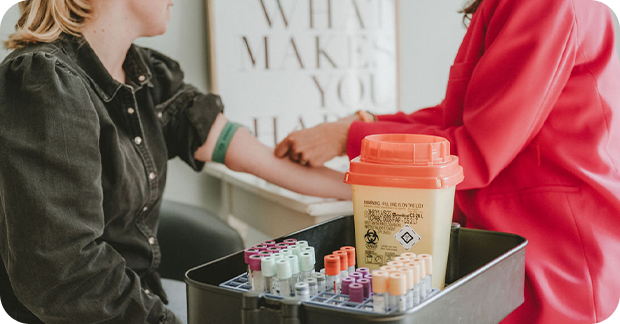
What can I arrange now?
- Write down your wishes in a birth plan and upload it to your pregnancy portal.
Good luck with thinking of and writing down your birth wishes! We look forward to discussing them with you soon!
Episode 06
The countdown can begin

sign up!
Write you in!
Hi! Subscribe to our 9-month plan by filling in your due date
and
automatically receive the information in your mailbox when you
need it. Accessible to everyone, even if you are not registered with our practice.
The countdown can begin
Your maternity leave has probably already started and the countdown can begin. It is good to take it easy during this period. You want to have enough energy to start the delivery. That is why we are giving you the information and tips you need in this final phase.
In this part of the 9-month plan we provide information about:
- When to sound the alarm
- Preparing your flight bag
- Being late, inducing and stripping
View the most important information and fun tips now on our page about the final stages.
The final stretch
You are probably currently on maternity leave and have really started counting down. Soon you will become mom and dad, or your family will be expanded even further. It is an exciting period of the final stretch. Here you will learn everything about this phase and get tips to get through it.
- Experience lower back pain
- Have trouble sleeping
- Have to urinate more often
- Retain more fluid
- Experience more frequent pre-labor pains
The countdown can begin
Your maternity leave has started and the countdown can begin—finally. Chances are that it feels that way, as things may be getting a bit tougher at this stage. Most women:

It is good to take it easy. For example, take a nap during the day and try to do things to relax. It is important to guard your own boundaries and listen to your body. Contact your midwife if you notice signs of a bladder infection, for example if you feel like you have to pee, but in the end you don’t. Other reasons to contact your midwife are:
- Headache
- Tingling fingers
- Upper abdominal pain
- Nausea
- Seeing stars
The movements in your belly
You may notice that your baby’s movements are becoming less. That’s not surprising; your baby has less and less space to turn and kick. The movements become smaller and you no longer notice them every time. Your baby’s sleep pattern also changes. The periods between powerful movements become longer as a result.
When you are on maternity leave, you can give all your attention and energy to your baby. This way you can easily take a rest when you feel the need. Are you unsure whether your baby is moving enough? Don’t hesitate to contact us!

Things you can try yourself:
- Take a break and eat something sweet.
- Adopt a relaxed position and focus on the baby.
- Make contact with your belly by placing your hands on your belly to feel the movements from the outside.
If this does not help your baby move more, or if you are worried, it is important to contact them. Do this in any case if:
- Your baby suddenly moves a lot less than you are used to.
- You are unsure whether you feel comfortable with your baby moving.

Prepare your hospital bag
Do you want to give birth in an outpatient clinic? Then you probably already have your hospital bag ready. But even if you want to give birth at home, it is good to have a bag ready. There may be situations in which you still have to go to the hospital. In those cases, it is good to be prepared. Important things to bring are:
- Passport/ID card and insurance card
- Clothing for your baby (in different sizes), such as a romper with long sleeves, trousers, sweater and a hat
- Clothing for yourself, before, during and after the birth
- Blanket for the baby
- Maxi-Cosi
- Phone charger
- Coin for the wheelchair
- Clothing and toiletries for your partner
- Your printed birth plan
Tip: Help yourself remember what the last things are to pack. For example, you can do this with a note on your bag or a label that you attach to it. Discuss this with your partner as well, so that he knows what he can still do.
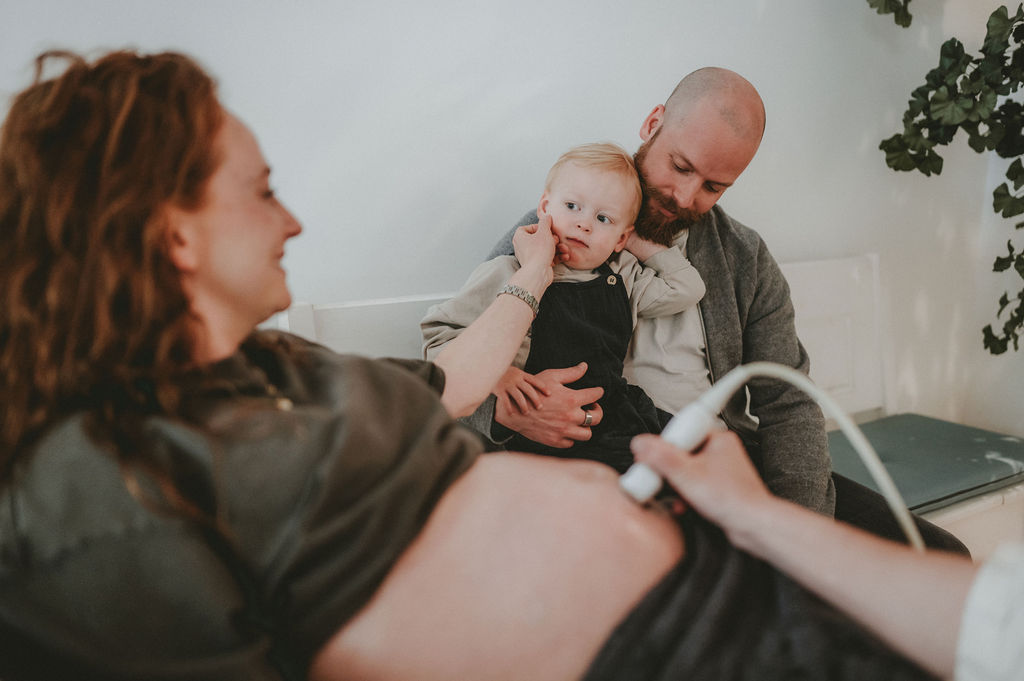
Overdue, induction and stripping
Your due date is estimated at the date that you are 40 weeks pregnant. Of course, this does not mean that you will always give birth on that exact date. With a normal pregnancy, you give birth between 37 and 42 weeks. If you are more than 40 weeks pregnant, we call that ‘overdue’. In 95% to 98% of women, the delivery is between 37 and 42 weeks. If a woman is more than 42 weeks pregnant, we call that ‘serotinity’.
Inducing labour
Being a few days late is no problem at all. Your baby determines its own rhythm. If you are more than 41 weeks pregnant, we will check you a little more often. After consultation with you, we will try to induce labour before the 42nd week, because more complications can occur then.
We will try to induce labour using ‘stripping’. During an internal examination, we will feel whether there is already dilation. If so, we will try to loosen the membranes from the cervix. Stripping releases a birth hormone (prostaglandins). This hormone makes the cervix ‘riper’ and can ensure that contractions start. We will not break your waters during the examination.
More than 42 weeks pregnant
We will always try to induce your labour so that you can give birth before 42 weeks. After 42 weeks, there is a greater chance of complications. When the placenta has reached its maximum lifespan, it may start to function less well. This can cause the amount of amniotic fluid to decrease, which means your baby will receive fewer nutrients.
In these types of cases, a situation may arise in which a baby is in distress. Because the risk of complications is greater from the 42nd week, we advise you to give birth under the supervision of a gynaecologist from then on.
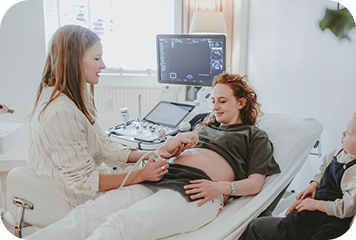
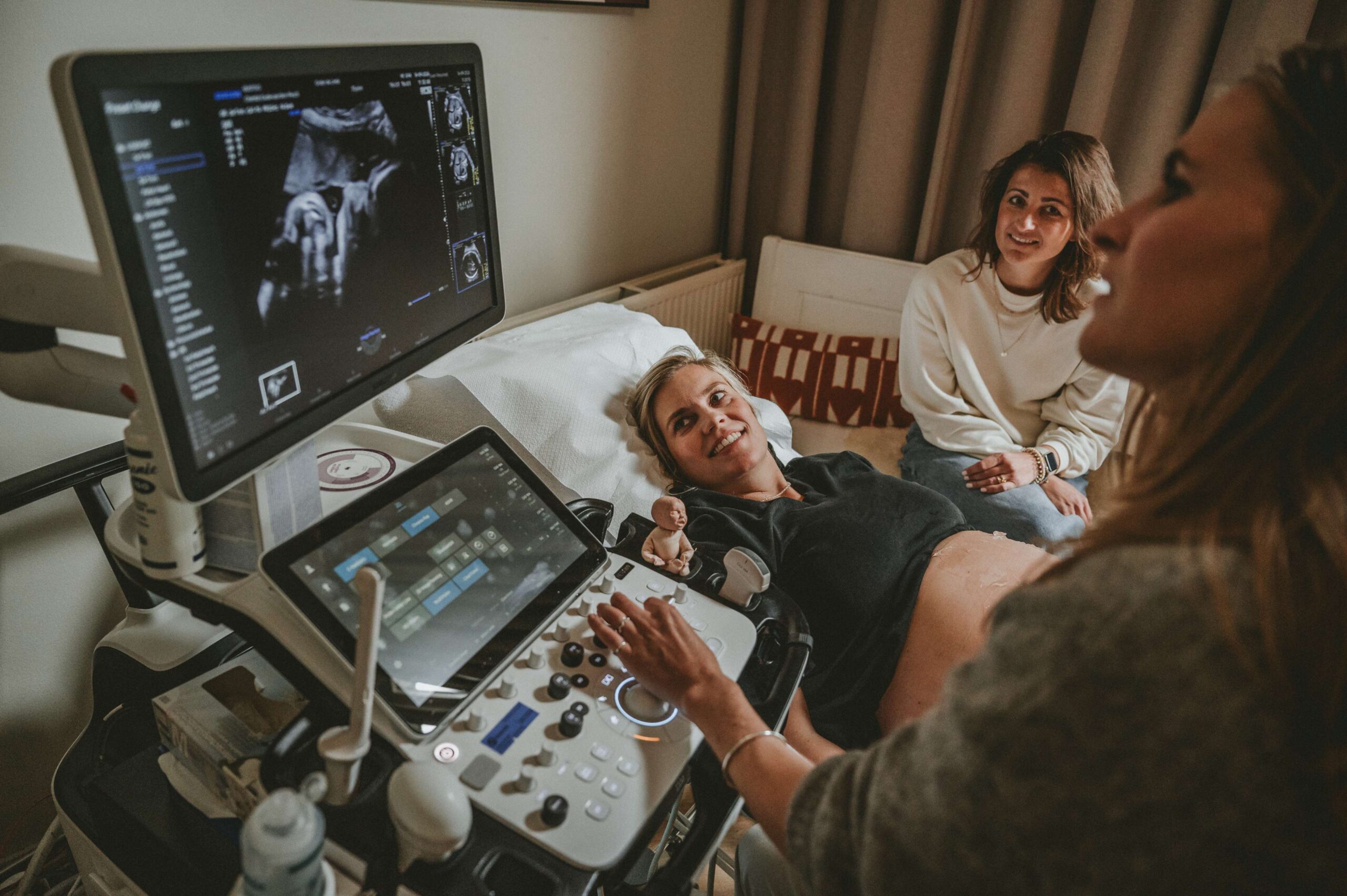
To induce or not to induce?
Inducing labor is called induction. In the hospital, a balloon is placed in your cervix or a gel is applied so that the cervix ripens and dilation occurs. If there is sufficient dilation, your membranes are broken and you are given contraction inducers (oxytocin) via an IV.
What can I arrange now?
- Pack the last things in your hospital bag, even if you want to give birth at home.
Good luck with the final steps and the last preparations for the big day!
Episode 07
You’re really going to give birth now

sign up!
Write you in!
Hi! Subscribe to our 9-month plan by filling in your due date
and
automatically receive the information in your mailbox when you
need it. Accessible to everyone, even if you are not registered with our practice.
You’re really going into labor
Your waters have broken, or your contractions have started. In this episode, we’ll give you the latest information and tips for during labor.
In this episode we discuss:
- The stages of your labor
- The golden hour
- The transfer of care from midwife to gynecologist
- Pain relief and medication
Read the latest tips and information for your labor here, but remember: keep breathing calmly! Every contraction will pass.
The baby is really coming
Your waters have broken, or your contractions have started: you are in labor. The baby is coming. Read all the tips and information about labor in this part of the 9-month plan.
- Call the midwife if your contractions come every 3-4 minutes for 1 to 2 hours and last 60 seconds.
- Also call us if you need us or are worried.
- Call if you lose more blood during contractions than normal during your period.
- Call if you lose amniotic fluid and the baby had not descended at the last check.
- Call if the amniotic fluid you lose is green or brown in color.
The stages of your labor
Your waters have broken or your contractions have started. When do you call us?
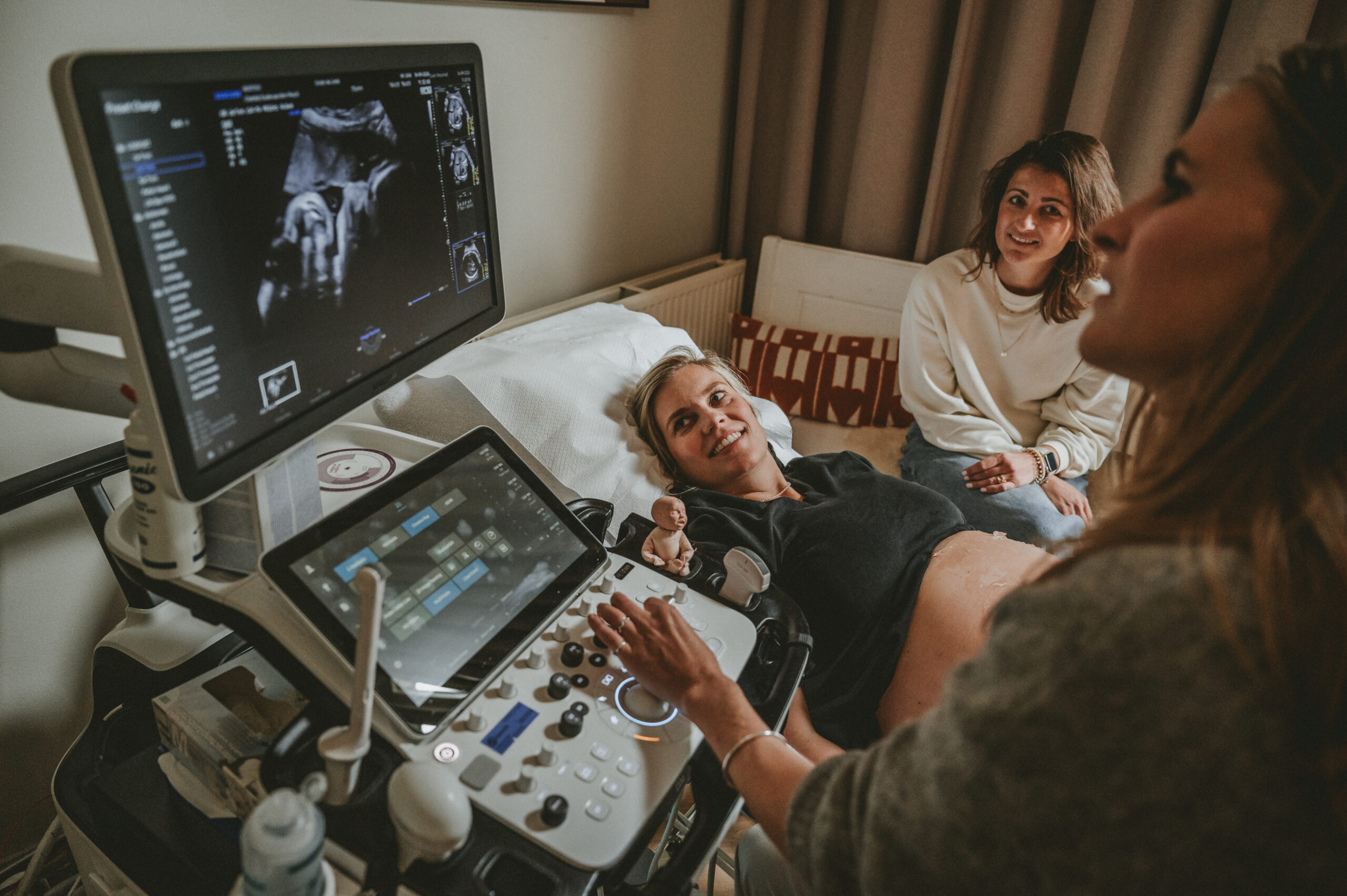
Please note: If your waters have broken and the amniotic fluid is clear, the baby was in the lower position at the last check and it is night:
- Go to sleep; there is a good chance that your contractions will start.
- If there are no contractions, let us know around 9:00 that your waters have broken.
Waters have broken
When your waters break, it is usually thought that labor has started, but only about 1 in 10 deliveries start with waters breaking. In the other 90% of cases, your waters break during the dilation phase.
Dilation and contractions
As mentioned above, in 90% of deliveries the waters break during the dilation phase. Contractions often start short and irregular. When you relax, they often become stronger.
During the latent phase, the first phase of your labor, your body prepares itself. Your cervix shortens and you become slightly dilated. It can still weaken if your contractions are irregular. They will then resume after a few hours or days. Just do everything you would do on a normal, relaxed day and save your energy for later.
During active labor, you need that energy. The contractions become more intense and come every 3 to 4 minutes. Try to time and keep track of the contractions. If the contractions last about 60 seconds and you have to sigh the contractions away, then it is time to call the midwife. With a first child, this phase lasts ten to twelve hours on average; with a second child, four hours.
From the first contractions, your cervix will shorten and open to a full dilation of 10 centimeters. Your baby will descend deeper into the pelvis and turn with his back to the front.

To the hospital
Do you want to give birth on an outpatient basis? Then you will stay at home during the first phase of labor. As soon as the contractions are strong and you are between 4 and 7 centimeters dilated, we will transfer you to the hospital. If you need something for the pain sooner, we will discuss the options with you.
The midwife who will be with you will call the hospital to check if there is room. She will tell you where to go, how to park and how it works exactly. You will now get in the car on the way to the hospital.
Due to the change in situation, the contractions may decrease due to the adrenaline that is created by the new environment. Adrenaline counteracts the contraction hormone oxytocin. Oxytocin ensures strong contractions. To promote oxytocin and reduce adrenaline:
- Ensure soft sounds and dim lighting.
- Create a quiet environment with few people.
- Turn off sounds from external stimuli (phones, laptops).
- Keep yourself warm with socks and turn up the heating.
- Surround yourself with love, for example by cuddling.
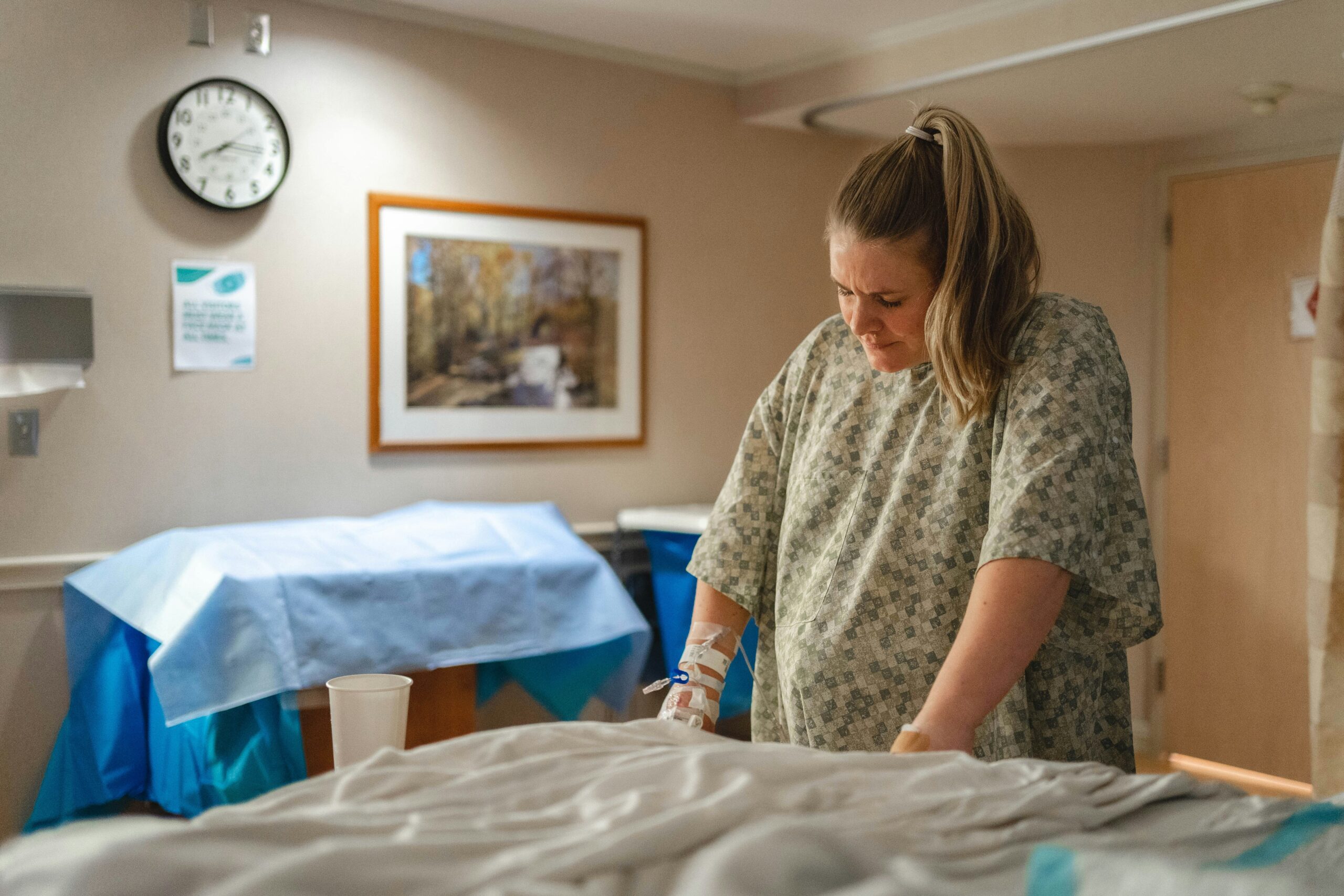
Pushing
At the end of the dilation period, the contractions become very strong. During the peak of the contraction, you get the feeling that you have to poop. This may feel a bit strange, but just let it happen. This feeling will get longer and longer and as soon as it is present during the entire contraction, you can give in to it. The pushing phase has begun.
During pushing, you push your baby through the pelvis and pelvic floor. The pauses between the contractions are often longer, so that you and your baby can recover. With a first child, this phase lasts about an hour; with a second child, an average of twenty minutes.
You choose the position in which you want to push. This can be on your hands and knees, on a birthing stool or on your back. Do what feels good and what you can endure.

Your baby is born
When your baby is born, we will immediately place the baby on your stomach. This will keep him or her warm. We always ask your partner (if applicable) to cut the umbilical cord. We will check you and stitch you up if necessary while the baby is lying with you. If everything goes well, we will not do any further checks for the first hour.
The Golden Hour
The “golden hour” is the first hour after birth, a crucial time for both mother and baby. During this hour, your baby is placed directly on your chest, which is called skin-to-skin contact. This moment not only promotes the physical and emotional bond between you, but it also offers important health benefits:
- Your body heat helps your baby to stabilize his or her temperature, heart rate and breathing. This is essential because newborns have difficulty regulating their own body temperature.
- The first hour is often a natural time when the baby instinctively seeks out the mother’s breast. This promotes a successful start to breastfeeding, because the baby can drink the first breast milk (colostrum), which is rich in nutrients and immune-boosting substances.
- In you, the hormone oxytocin is released through physical contact, which promotes bonding and reduces the chance of postnatal complications such as bleeding. For the baby, the hormone has a calming effect, which helps to reduce stress after birth.
- Through skin-to-skin contact, your baby comes into contact with your bacteria, which helps to develop his or her immune system.
In short, the golden hour is an important part of the first phase after birth, because it supports a natural and healthy start to your baby’s life and offers a safe, calm transition to the outside world.
After this, we will examine and weigh your baby extensively. To promote blood clotting, it is good to give newborn babies vitamin K. We give this in a high dosage after birth. From day 8, you give this yourself daily.


From midwife to gynaecologist
In certain situations, the help of a gynaecologist may be necessary during childbirth, for example:
- If the baby has pooped in the amniotic fluid
- If you want pain relief
- If the labour is not progressing
In less than 1% of cases, the switch to a gynaecologist is necessary due to the condition of your child.
When care is transferred to the gynaecologist, your midwife will leave as soon as you have settled in. In the hospital, it is important to take the initiative yourself, because there is not always continuous supervision as with the midwife.
Pain relief
If you give birth in the hospital, you can use pain relief. In the Netherlands, you can decide for yourself whether you want pain relief or pain relief. We discussed more information about this in episode 6 of the 9-month plan. Want to know more about this? Then watch this episode for all the information about pain during labor.
Episode 08
The birth is (almost) over!
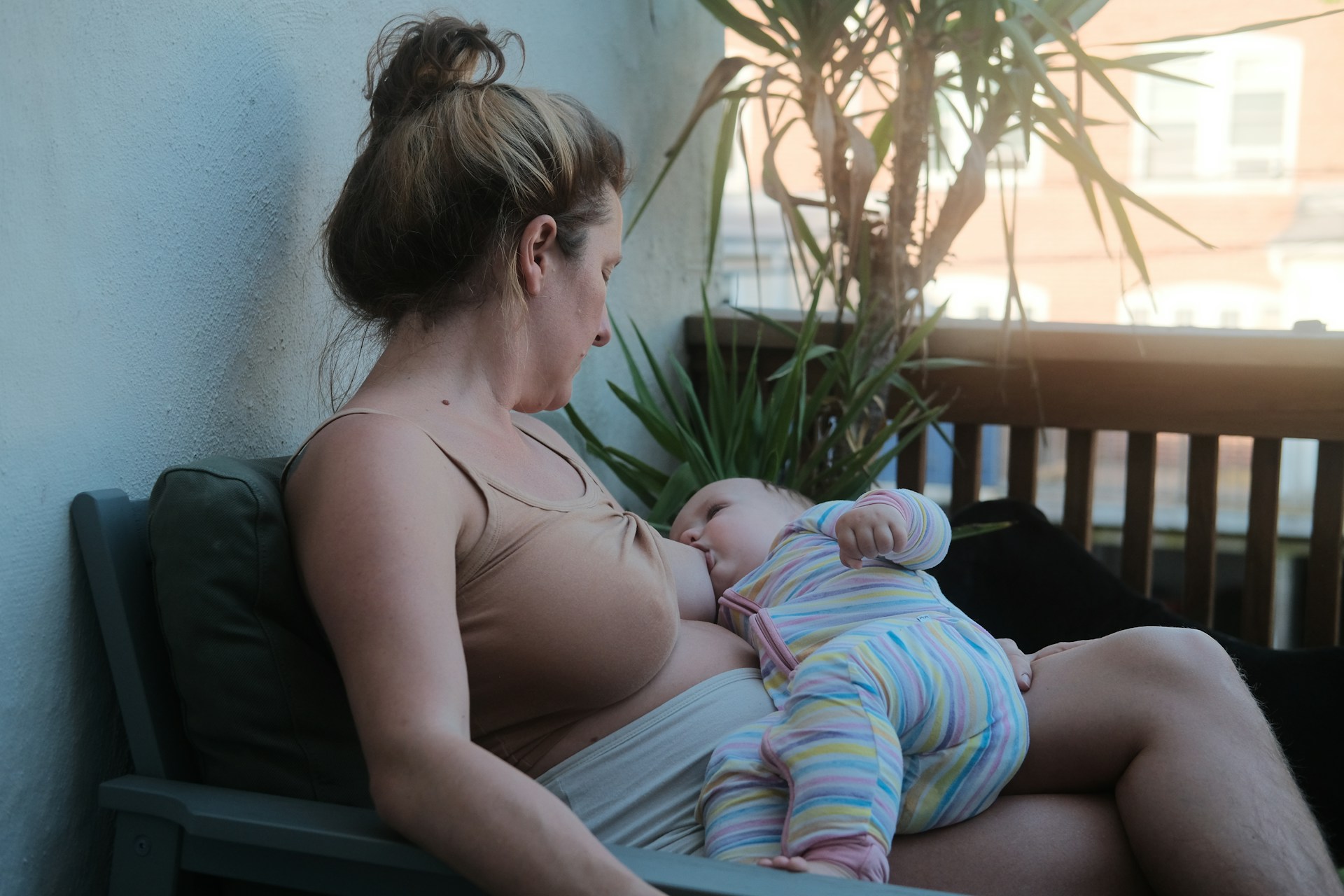
sign up!
Write you in!
Hi! Subscribe to our 9-month plan by filling in your due date
and
automatically receive the information in your mailbox when you
need it. Accessible to everyone, even if you are not registered with our practice.
The delivery is (almost) over!
Maybe you’re just on your way home from the hospital, or the midwife has just left. And then… What now? Don’t worry! In this episode of the 9-month plan, we share useful information and tips for the postpartum week, so that you can get through this special time calmly and well-prepared.
What to expect in this part of the 9-month plan:
- Important information about your and your baby’s recovery
- Support from maternity care and midwife
- Nutrition for your baby
- How and when to register the birth
Discover everything you want to know about these first days after giving birth.
The delivery is behind you
You’ve just given birth and are on your way home from the hospital or the midwife has just left your home. Uh, what now? Don’t worry. In this penultimate episode of the 9-month plan, you’ll find all the information and tips for the first 24 hours after your delivery.
- A pink or slightly tinted skin color
- A temperature of between 36.5 and 37.5 degrees
- A little nausea due to swallowed amniotic fluid in the first 24 hours is normal
- Your baby can breastfeed as often as he or she wants in the first 24 hours
- Your baby is too hot or cold
- They want to suck, for example on your little finger
- They are hungry
- They need a clean diaper
- Or your baby just wants to be with you
A healthy baby and mother
A newborn baby has certain characteristics that indicate that he or she is doing well:
Your baby also communicates immediately after birth by crying. This can mean that:

There are also certain signs of good recovery for you as a new mother. In the first hours after giving birth, you can expect that:
- You will lose a maximum of one maternity pad per hour
- A paracetamol will help with any afterpains
- Urinating in the shower can help keep wounds clean
- Your body will drain fluid by sweating and urinating more
Support from maternity care and midwife
You are certainly not alone after giving birth! During the first eight days, you will receive help from a maternity nurse. She:

- Performs physical checks on you and your baby
- Helps to get breastfeeding started
- Gives tips on caring for your baby
- Helps, if possible, with some household chores (depending on the number of maternity care hours requested)
In addition to the help from the maternity nurse, we will also visit your home two to three times after your delivery, if necessary. We will come to see how your baby is doing, but we will also pay attention to how you and your partner are feeling. We also offer support with breastfeeding and other ailments that have arisen during or after delivery.
In addition to the help we offer with physical discomfort, we also support you (or you) on a mental level. It is a big change and not always the rosy cloud you hear about. The postpartum period can be an intense and emotional period; that is why we also provide support on an emotional level. We are available 24 hours a day for the first ten days after your delivery in case of emergencies or concerns.

Your baby’s food
Breastfeeding is a beautiful bonding moment between mother and child. It is not only very nice, but also very practical. You always have the food for your child with you at the right temperature. As we have already mentioned in previous episodes, you decide for yourself whether you want to breastfeed or prefer bottle feeding. If your breastfeeding does not get going, it is probably necessary to switch to formula anyway.

Tips for latching on your baby:
- Make sure you are sitting or lying down relaxed.
- Focus on yourself and your baby, and try to let go of other thoughts for a moment.
- Place your baby with his tummy against your tummy.
- Bring your baby gently to the breast to latch on.
- Stimulate a big bite by letting your nipple go over your baby’s upper lip.
- Make sure that your baby’s lips are curled outwards for a good fit.
- For your own fluid balance, it is important to drink a large glass of water with every feeding.
Your baby will often start sucking with quick movements to stimulate the let-down reflex. When this is successful, your baby will drink with long strokes and will pause every few large gulps to swallow. When you hear swallowing, you know for sure that your baby is drinking well.
Extra vitamins for your baby
In addition to food, extra vitamin K and D are important for your baby.
- Vitamin K: When breastfeeding, you give 150 micrograms of vitamin K daily from day 8 until the first 12 weeks. This is not necessary with bottle feeding, as vitamin K has already been added.
- Vitamin D: All children, regardless of their diet, need 10 micrograms of vitamin D per day until they are four years old.
Help with breastfeeding
Are you having trouble breastfeeding or is it not going well? The maternity nurse and midwife can offer help, which in most cases will help it get going well. For extra help, it can be helpful to call in a lactation consultant.


Birth registration
As we have already mentioned, it is important to arrange recognition during your pregnancy if you are not married. After the birth, your partner must report the birth to the municipality within three days. Take the proof of recognition with you (if you are not married) and do not forget the identification of both the mother and the partner.
And further:
For the partners
- The same applies to partners: stopping smoking, drugs and alcohol increases your fertility
- Do you take medicines: ask your doctor or pharmacist whether the medicines can affect your fertility
Read Tips
The growth guide and soonzwangerworden.nl contain tips and advice on how to
get pregnant as healthily as possible.
What can I arrange now?
- Send your partner to register the birth
On behalf of all of us, congratulations on the birth of your child!
Episode 09
Your first weeks as a (larger) family

sign up!
Write you in!
Hi! Subscribe to our 9-month plan by filling in your due date
and
automatically receive the information in your mailbox when you
need it. Accessible to everyone, even if you are not registered with our practice.
Your first weeks as a (larger) family
You have been living as a (larger) family for a few weeks now. It may have taken some getting used to at first, but you have probably (almost) found your feet now.
In this last part of the 9-month plan, we will tell you the last things about:
- Life with a baby
- Pay attention to your pelvic floor
- Working after your pregnancy
- Contraception
Read all the important information and facts about the last phase of the 9-month plan on this page.
Life as a (larger) family
You gave birth to your baby a while ago. Maybe you are already completely used to the new family structure, or you are still getting used to it. In this last part of the 9-month plan, we will give you information and tips for the last time that you can use during this period.
Life with your baby
When you become a parent for the first time, you usually have to search for what exactly your baby wants. That is very normal. Babies between 2 and 10 weeks old cry an average of 2 hours a day.
By crying, your baby indicates what he or she needs, which also contributes to development. Rest and regularity can help your baby cry less. The Happiest Baby method by Harvey Karp helps many parents to calm babies and help them sleep better.
- Swaddling – Tightly wrapping the baby gives a sense of security.
- Side/Stomach Position – A safe, calming position (under supervision only).
- Shushing – Mimicking the rustling sound in the womb.
- Swinging – Gentle rocking movements help to calm the baby.
- Sucking – A pacifier or breastfeeding can have a calming effect.
This method mimics the soothing environment of the womb. The idea is that babies need extra comfort in the first three months, because they are still in a kind of “fourth trimester” and are adjusting to the outside world. The “5 S’s” technique is used for this:

Pay attention to your pelvic floor
The muscles in your pelvic floor are softened by the pregnancy hormones and are stretched considerably during childbirth. It is therefore important to pay attention to the recovery of your pelvic floor after your pregnancy. Pelvic floor exercises help to get these muscles back in shape.
For example, you can learn these exercises at a course for women who have just given birth. It is important to keep this up for a few months. Research shows that training specific muscles has a positive effect on preventing (stress) incontinence later in life.
Do you continue to have complaints after doing these exercises consistently for a few months? Then visit a physiotherapist who specializes in pelvic floor problems. They can help you train these muscles.
Recovery and exercise
If you have just given birth, you may not be thinking about exercising yet. Or maybe you want to get fit again from week one. It is important to take a lot of rest in the first period after your pregnancy. Your body needs to recover and recover from pregnancy and childbirth, which requires a lot of rest and good nutrition in the first weeks.
When can I exercise again?
On average, women are ready to start exercising again six weeks after giving birth. Build up your fitness and muscles slowly, listen to your body and respect your limits.
For example, you should train your abdominal muscles by feel. During your pregnancy, your abdominal muscles spread apart to make room for the growing baby. A few weeks after giving birth, you will notice that your rectus abdominis muscles come back together.
Do you want to know if you can exercise all your abdominal muscles? The midwife will check this for you during the follow-up check.

Back to work after your pregnancy
You may not be thinking about going back to work now that you are in your ‘bubble’ with your little one. Fortunately, in the Netherlands we have a system in which you are entitled to an average of 10 weeks of maternity leave after giving birth.
In the first year of your child’s life, you are also entitled to 9 weeks of parental leave. This applies to both the mother and the partner. You can apply for this with your employer and spread it over the first year of your baby’s life.

Breastfeeding
If you are breastfeeding and returning to work, there are also rules for this in the Netherlands. For example, you are allowed to spend a quarter of your working hours pumping, and your employer is required to provide a suitable space for this. If you prefer not to pump at work, you can also reduce your pumping. You can continue to breastfeed, but your baby will then receive a larger amount before work hours.
Do you have any questions about breastfeeding, reducing your pumping or pumping? Our lactation consultant will be happy to help you.

Final Centering Pregnancy meeting
If you have attended the Centering Pregnancy meetings, it is almost time for the final appointment. Physical and mental recovery are central to this meeting. Here you can talk together about how parenthood is going, share tips and admire each other’s babies. We would also like to hear your story about the birth and your experiences so far.
During this meeting we can check your abdominal muscles and inspect your wound. At the end of this session we will conclude the care together. The circle is then nicely complete and you can enjoy your new family.
Fertility and contraception
Is your family complete, or do you not want to expand your family for the time being? Then it is a good idea to think about contraception. Two weeks before your first period, you have your first ovulation again; you are therefore fertile. Your period can start again after 4 to 6 weeks, but if you are breastfeeding, it can also take months.
If you do not want to get pregnant again for the time being, it is important to think about contraception in good time. Keep in mind that some forms can affect the quality of your breastfeeding. To make a good choice that suits you, you can use the choice aid at anticonceptie.nl.
Having an IUD inserted
If you choose an IUD, we can also help you. Marieke can insert an IUD from 13 to 14 weeks after giving birth. Discuss the different contraceptive methods with us, so that you can make a well-considered decision.

We wish you lots of happiness with your beautiful family! Although care ends after six weeks, know that you can always contact us with questions.
Love, team Onder de Linde
Episode 010
Intimacy during pregnancy, (breast) feeding & lactation consultant

sign up!
Write you in!
Hi! Subscribe to our 9-month plan by filling in your due date
and
automatically receive the information in your mailbox when you
need it. Accessible to everyone, even if you are not registered with our practice.
I want to get pregnant quickly
You’ve figured it out: you want to get pregnant! Probably as quickly and healthily as possible.
Read
what you can do and more interesting facts for a good start, your cycle,
LH peak
and your fertility.
In brief
- The placement of an IUD can be experienced as unpleasant or painful.
- Of all couples who try to conceive, 80-90% of them succeed within a year.
- The chance of pregnancy is greatest if you have sex every 2 or 3 days in the six days before ovulation (ovulation is 2 weeks before the start of the next period).
- Take 400 mg of folic acid daily from the desire to become pregnant until 10 weeks of pregnancy.
Your cycle and your fertility
In order to become pregnant, an egg must be fertilized by a sperm cell. In women, an egg is released from one of the ovaries, this happens (almost) every month, the so-called ovulation. Ovulation occurs 14 days before menstruation. If you menstruate regularly, the moment of ovulation can be predicted fairly accurately. If your menstrual cycle is irregular, it is more difficult to predict.
- More vaginal discharge, which is thicker and more slimy than you are used to. This makes it easier for sperm to reach the eggs that have traveled through the fallopian tube to the uterus.
- Your libido often increases (handy!).
- Some women feel ovulation in the lower abdomen, just above the groin.
- The LH peak in your urine increases around ovulation. If you keep track of when you menstruate, what your temperature is and what your vaginal mucus looks like for a few months, you will gain a lot of insight into your own menstrual cycle and this will increase the chance of pregnancy.

Calculate when you ovulate with an ovulation calculator. Or use ovulation tests
that measure the LH peak in your urine: the LH hormone is increased around ovulation. The
chance of ovulation can decrease, for example due to: stress, very intensive
sports or heavy physical labor, losing a lot of weight, low body weight,
overweight or the menopause (the beginning of the menopause).
Having sex in the fertile period
To get pregnant, it is usually enough to have sex every two or three days. More often is allowed, but is not necessary. The sperm cells remain alive in the uterus for a few days. Do you know when you ovulate: most pregnancies occur after having sex in the six days before ovulation.
Preparing for your pregnancy: live healthy
Fortunately, nature ensures that almost every child is born healthy. However, there are also things you can do to increase the chance of a healthy child and a healthy pregnancy. This starts when you get pregnant. In addition, the first weeks of pregnancy are very important for the development of a child. Most women only know they are pregnant after those first weeks.

Folic acid
The chance that a child will be born with spina bifida is small. You can further reduce this chance by taking folic acid. 400mg of
folic acid per day promotes the closure of the central nervous system around the 8th week of pregnancy. Do not stop taking folic acid until after 10 weeks of
pregnancy.
Healthy weight
A healthy weight gives you the best chance of pregnancy and
less chance of complications during pregnancy and childbirth. We define an
optimal weight as a BMI between 20 and 25.
Calculate your BMI HERE.
See if you can reach a healthy weight with healthy food. If
this is not possible, make an appointment with a dietician, who can often help you
quickly and effectively. We work closely with the dieticians of Steenstra en de Vries at our location in West.

Smoking
Stop smoking well before you become pregnant. Smoking reduces
fertility. It increases the risk of fetal death, premature birth and low birth weight. Smoking and passive smoking during
pregnancy increases the risk of cot death. Do you want help quitting
smoking: SMOKING AND PREGNANCY
Alcohol
Consuming alcohol can affect your fertility and has
an effect on the embryo in the first weeks of pregnancy. Drinking
alcohol by your partner also affects his fertility. Do you want to know
all the ins and outs: alcohol and pregnancy.
Medication
If you want to become pregnant, only take medication after consulting a doctor.
This also applies to your partner. Sometimes it is wise to stop taking medication in the run-up to pregnancy, to switch to another medication or to adjust the dosage of your medication. Only paracetamol may be used during a pregnancy wish and during your pregnancy without consultation.

Work
There may be circumstances at work that affect your fertility,
or affect it during an early pregnancy. Consider risks
such as: contact with hazardous substances such as solvents or
pesticides, irregular working hours (such as shift work
and night shifts), physically demanding work, unhealthy stress, an
environment with noise/overpressure/body vibrations/extreme heat or cold,
contact with radiation. Discuss the consequences of this for a pregnancy
with your employer or an occupational health physician. Together you can look at adjusting
your work and/or working hours. If you work with small children and
have never had chickenpox: consider getting vaccinated before
pregnancy. Click here for more information.
Drugs
Drugs have a negative effect on your fertility, and when
used around conception they can cause congenital
defects.
When to contact us if you want to get pregnant?
- It is possible that sex is not going well. Discuss this with your
partner or contact your GP or us to talk about it. Experience shows that this helps. - If you have a chronic illness such as diabetes, high blood pressure,
thyroid disease, epilepsy, thrombosis, asthma, depression and
anxiety disorders, this deserves extra attention before pregnancy. - If there is a hereditary illness in your immediate family (or that of your partner), such as
cystic fibrosis,
muscle diseases, Down syndrome or spina bifida. If you are related to your partner, the chance of a hereditary condition manifesting itself is greater. - If it is unclear whether ovulation has occurred (for example because you have not menstruated for six months);
- If you have been trying to conceive for a year.
Consultation for trying to conceive
If you are having trouble getting pregnant, find it difficult to get a grip on your cycle or want personal advice before you become pregnant: make an
appointment with us or a midwife in your area for a
consultation on trying to conceive.
The midwife will ask you to fill in the pregnancy guide so that she can
prepare herself well for your conversation.
This is how you get in touch with us.


Did you get pregnant? Then read more in our 9-month plan about:
- The advantages of the Dutch obstetric system.
- Which obstetrician do you choose and how will you be guided?
- Healthy lifestyle: nutrition & exercise
And further:
For the partners
- The same applies to partners: stopping smoking, drugs and alcohol increases your fertility
- Do you take medicines: ask your doctor or pharmacist whether the medicines can affect your fertility
Read Tips
The growth guide and soonzwangerworden.nl contain tips and advice on how to
get pregnant as healthily as possible.
To do
- Take 400mg folic acid daily
- Keep enjoying each other, then getting pregnant will be easier.


